#This post is not a place for arguing why you should be allowed to dislike or criticize X Sonic property for the record
Explore tagged Tumblr posts
Text
Anyone else get that feeling that whenever it's about the Sonic games themselves everyone is like "the writing is just a mess and the characterizations are no different" but the moment it's about a Sonic adaptation (new show, movie, comic, etc) suddenly the Sonic cast has solid characters and the bad bad adaptation is making them so ooc?
#fandom wank#sonic the hedgehog#I just be ramblin#Sorry I know I haven't been a Sonic fan my entire life or anything#but I know that when it comes to talking about how the games are handled there's at least the idea that 'it sucks but we like it anyways' or#'everyone agrees the writing/characterizations are often ass you know how it is'#Especially given how many rewrites there are out there for Sonic Forces alone#But then people are talking about IDW or Sonic Prime and suddenly it's all “#'hashtag NOT MY SONIC'#'These characters are SOOO ooc why would ANYONE read this the characterizations suck they'd NEVER do that'#People complaining about Prime Sonic being emotional or immature or complaining about IDW Sonic being sympathetic in any fashion#I'm not saying that the adaptations can't be criticized I'm just criticizing people who 'accept the games are bad' and then turn around#when there's an adaptation and act like the Sonic games are this paragon of consistency and continuity that the bad bad adaptation is#ruining the sanctity of#This post is not a place for arguing why you should be allowed to dislike or criticize X Sonic property for the record
6 notes
·
View notes
Text
Steve's Family Christmas
Hello and welcome to my Christmas AUvent Calendar! Every day from now until the 24th I will be posting a ficlet that is 500-1500 from an AU I've done over the years.
All stories will be marked with the tag #12 aus of christmas so you can follow along as I will only be tagging my permanent list for this (it would get too confusing otherwise).
The next one on our list is: Grief (a Friend Indeed). You can read the first story here. All links will be to the first chapter, but the chapter itself will have links to the rest of the story.
Day 1 Day 2 Day 3
~
Steve was sure that his house never had so many people in it the entire time its stood in Loch Nora.
Most of Eddie’s family was here, Penny and Danny, Lauren, Oliver, and Gale. While Danny’s brother Hal was staying with Eddie and Wayne. His uncles Percy and David Kincade were in his parents old room. Penny and Danny were in the guest room across from the master bedroom, while Lauren and Gale shared the guest room next to his bedroom. Oliver was put in the basement next to the game room.
He was looking at about half of them sprawled out over the sofas in the living room with utter helplessness.
David came up and put his hand on Steve’s shoulder. “Don’t worry about all this, Percy and I will help keep the chaos to a minimum. Just rely on us, okay?”
Steve let out a long sigh and nodded.
The other members of the Munson clan were set to join them at any minute so they could go over the Secret Santa rules and let everyone pull a name out of a hat. And if you got someone you didn’t know well there was a poster in the kitchen that had a cheat sheet of people’s likes, dislikes, and any allergies they might have.
Everything was primed to go smoothly. Which was precisely why Steve was so nervous. He didn’t know everyone very well, but those he did? Thrived on chaos.
It took all of five minutes for a fight to break out between the Nelsons and the Kincades.
“I��m just saying that there should be maximum amount,” Penny was saying, “that way the kids can still get their Secret Santa a gift and not see someone else get something outrageous like a new car or sports equipment, something ridiculous.”
“Money is no object,” Percy said dryly, crossing his legs leveling her with a glare. “I have no trouble giving someone the money they need if they want to get an extravagant gift.”
“And I’m saying that they shouldn’t have to,” Penny argued. “Because if you’re just going to give everyone the money then we might as well just buy everyone a gift, no holds barred.”
David shook his head. “That’s not the argument you think it is. It’s what Percy and I wanted to do in the first place.”
Penny blinked at him for a moment, mouth opening and closing without sound coming out at all.
“I have the perfect solution!” Steve said before the tension could mount further. Everyone turned to Steve. “You can spend however much you want–” there was a bunch of grumbling from the Nelsons and Percy and David looked too smug for words, “but! You have to make it yourself. It has to be homemade. You can’t buy it, you can’t pay someone to make it for you. You have to make it yourself.”
“Oh,” Percy purred. “That is elegant. I approve.”
Penny and Danny shared a concerned look, but they really didn’t have an argument against it.
“I’m down,” Wayne said, “I think it’s a great idea. Gets everyone thinking outside the box and sure, some crafts are going be more expensive, like painting or knitting. Or even woodworking, which is what I’m going to be doing. Is borrowing equipment allowed, Steve?”
“Sure is!” Steve said with a grin. “As is renting it as long as the finished product is something you made, it counts. Writing songs, poems, stories totally count too. It’s something you made.”
Eddie grinned up at his boyfriend. He could have drawn something in a pinch, but letting him write a song? That would be even better. “I’m sold!”
Steve breathed a sigh of relief at a crisis well and truly averted.
~
If Steve thought it was chaotic with a dozen people, adding almost double that made for a wild time that’s for sure.
There were two Secret Santas planned. One for Eddie and Steve’s families and one for all the friends. Eddie had the worst luck and gotten both Oliver and Mike.
“Normally, I’d say just buy two copies of the same album,” Steve suggested, “and just wrap them differently so you know which is which, but...”
“I have to make something for Oliver,” Eddie huffed.
Steve kissed the top of his head. “You’ll think of something. You always do.”
“Yeah, sure Mr. Lucky over here,” he groused. “You got me for the family gift giving and Robin for the friend. You have this in the bag!”
Steve did feel bad about that one. But he picked last, no one could claim he cheated. He had already bought Robin a couple of books on cinema and film making. She had gotten a video camera from her parents on her birthday and thought herself the next Martha Coolidge. For Eddie, he had gotten the recipe for his favorite spice cookies from Wayne was planning on making him a box of them.
The day arrived and the gifts were handed out. Steve had gotten a small stainglass picture of the sun and the moon from David.
“I cut the pieces of glass and welded the metal together,” David explained. “I assume it counts.”
“It’s beautiful!” Steve gasped and gave him a hug for it.
Eddie was happily munching on his cookies and swatting away anyone who tried to sneak one.
Everyone was happy with their gifts and even Penny had to admit that homemade had made for some very thoughtful gifts. Even if, as with David’s gift to Steve, it must have cost a lot of money.
Wayne came up to Steve as the blended families showed off their gifts to each other and just having a good time.
He placed his hand on Steve’s shoulder. “You did good, Steve.”
“It’s nice to have all my family around for the holidays,” he murmured. “And I consider the Munson and Nelson clans as family.”
“You thinkin’ about marrying into the family?” Wayne teased with a grin.
“If it was legal,” Steve said with an answering grin, “I’d do it tomorrow. Or, you know when the county offices opened again after New Years.”
“Well,” Wayne said, “I’d be happy to have you in the family and I even like your uncles, too. It’s nice seeing that boy so happy.”
Steve looked over at Eddie who smiled up at him. Then he came bounding up to them.
“Stevie!” he said brightly. “Come help me convince Oliver to come to the friends’ do so he can meet Mike.”
Steve laughed and let Eddie haul him back into the crowd.
Hal came up beside Wayne. “It may have taken a death in the family to bring us all together but I think your mom would have been proud today.”
Wayne smiled, tears misting his eyes. “I think she would have, too.”
“Merry Christmas,” Hal murmured.
It certainly was that.
~
Day 5 Day 6 Day 7 Day 8 Day 9 Day 10 Day 11 Day 12
Tag List: CLOSED
1- @itsall-taken @redfreckledwolf @zerokrox-blog @sadisticaltarts @dolphincliffs
2- @gregre369 @a-little-unsteddie @chaosgremlinmunson @cryptid-system @kultiras
3- @maya-custodios-dionach @goodolefashionedloverboi @val-from-lawrence @carlyv @wonderland-girl143-blog
4- @bookbinderbitch @bookworm0690 @forgottenkanji @dreamercec @blondie1006
5- @yikes-a-bee @awkwardgravity1 @genderless-spoon @fearieshadow @thesecondfate
6- @dragonmama76 @ellietheasexylibrarian @thedragonsaunt @useless-nb-bisexual @disrespectedgoatman
7- @counting-dollars-counting-stars @tinyplanet95 @ravenfrog @swimmingbirdrunningrock @lingeringmirth
8- @gutterflower77 @a-lovely-craziness @just-a-tiny-void @w1ll0wtr33 @beelze-the-bubkiss
62 notes
·
View notes
Text
This is physical assault:

This is physical abuse:

And this is what Sarah said about Azriel:

"I'm kinda scared of him"
The torturer.
The guy who hurts unarmed people to get information.
The guy who physically attacks others simply because he didn't like their words.
STOP belittling the side of the fandom who is arguing for the rights of Tamlain shippers. We don't have to care about the ship to understand right or wrong in a place where it clearly doesn't matter what the author said about her characters (since you're pulling the "Sarah hates Tamlin" card) considering she told us she herself would be afraid of Az yet many ship her with someone who dislikes cruelty, a character Sarah said shares her real life energy.
A place where it clearly doesn't matter what Sarah said because she said she wants the men to treat the women like equals (a problem she had with Tamlin and Feyre in the first place) and Azriel absolutely does not do that with Elain. If what Sarah said in the past mattered than everyone would be shipping an Elucien endgame considering she said they'd have tension, healing and growth together. That Elain took both she and Lucien by surprise.
Some continue missing the point, saying we're insensitive for not taking someone's triggers seriously, why it's a valid reason to ban content in a week that was supposed to be welcome to all yet we sit here watching those same people pick and choose who is considered abusive when it's canon that Azriel has physically assaulted multiple others. It's not just "assault against women". Assault against anyone should be something you care about if that's the hill you're standing on in the fandom.
Your argument falls flat when you are being a hypocrite.
Those who argue we're insensitive are the same people liking and creating posts on how Gwyn is secretly evil, how a SA survivor is luring Az, how she can't enjoy kinky sex because of what happened to her.
You want others to respect your triggers yet you have ZERO respect for everyone else's. You want to create non canon content time and again for your ship yet have an issue with Gwynriels, Elucien's, and Tamlains creating non canon content for theirs, where in an alternate world in an appreciation week all should be welcome regardless of what you personally like or are bothered by. You can't remain impartial? Then offer the position up for someone else, I've seen many willing to take up the role of moderator for the week.
If you're allowed to justify the abuse your favorite is guilty of because of nuance then you have no right to demoralize those that do the same.
55 notes
·
View notes
Note
Oh!! Btw! I'm a drag artist and I'm doing a drag cosplay of starscream for pride and tfnation 2023 and sometimes when I question if the look is too fem or cutesy shaped, I think about your starscream and I remind myself that I'm serving cunt actually. Thank you for your service
hi!! I absolutely love both of the asks you sent but I hope you don’t mind me responding to this one with a little bit of personal musing—specifically about Starscream and femininity, lol. (long post warning!!)
I cannot stress enough how generally positive and supportive reception to my changes has been, especially in the case of Starscream—that being said, I do think about the occasional pushback I get every so often, and how it feeds into why I make the choices I do
starscream has always been a feminine character, which I think is part of why a lot of people are drawn to it in the first place—even talking to older fans, who grew up with the original show, there seems to be this implicit understanding that Starscream is something “other” (“pretty poison” as a beta name should tell you quite a bit). this is something that has remained relatively consistent in the entirety of transformers—albeit in, I’d argue, the worst way possible.
there are a lot of character decisions I dislike on a thematic level that vary across continuity, but one extremely reliable element of any Starscream is the way femininity defines their villainy. you’re never supposed to like the “feminine” traits. they’re played for jokes and comically exaggerated at best; at worst, any and all Starscream redemption arcs are completely dependent on grappling with emasculation, and shedding the feminine. Even in continuities where other characters (a whole other ballpark) are murderous, abusive, and violent, Starscream is canonically regarded as morally lesser, specifically because their villainy manifests in the feminine. masculine, “active” displays of malice are more noble and admirable than the “passive” and “feminine” act of quiet scheming and deception.
I’m not saying that Starscream doesn’t do bad things, obviously, but this is such a constant theme that it has thoroughly leeched its way into fan spaces as well. I’m not really active in fan communities anymore, but I will always feel frustrated with how the character’s femininity is simultaneously misunderstood and exploited, because that is the natural reaction to femininity. it is inoffensive and clean and neat, and it fits into one of very few digestible archetypes, because it is not perceived as a natural form of expression, but an other. it is only allowed when it is attractive and easy to understand.
this is something that extends to women, as, obviously, in a performative binary womanhood is a shorthand for femininity. “woman” is an other, and feminine women exist in palatable, digestible archetypes. even with all the progress we have made it is really not common to see women or feminine characters in general treated with equal respect or interest, and, the more you pay attention, the more you’ll notice a total apathy for their feelings, struggles, and complexity.
I know this is all really dense, but I bring that all up to say that there is a reason I want to spotlight and elaborate on Starscream’s femininity. it’s a trait that is inherent to the character, but I’d argue that there hasn’t ever really been a moment where that femininity ever manifests as something positive. it’s a derogatory label, but never something the character owns.
I want to see a Starscream that is confidently feminine and “cutesy” because the character has never been afforded that luxury! moreover, I want to portray a fully femme Starscream because there is no reason that should change the character’s complexity or their queer association! (I once saw the argument that making Starscream a girl would be “erasing the character’s queer history” and that kind of sums up the casual effect of misogyny in these weird online spaces, lol. granted that doesn’t mean you can’t project or imagine any gender identity you want for the character—I think that’s very good, actually!!) even though I have never personally been a feminine person, I’ve always been really attached to Starscream’s femininity and the idea of a femme-presenting version because there was a sorely lacking character type I desperately wanted to see—a messy, bitter, and by all means “evil” person who was also feminine, without those things being linked via cause and effect. I hope that makes sense?? essentially, a very feminine girl whose femininity wasn’t the implicit or explicit cause of their moral failings, and was instead treated as. yknow, a neutral mode of expression
anyway, I am very sorry for saying so many words about something pretty trivial here. if you couldn’t tell transformers was the thing that first got me thinking about gender and themes and media critique as a child, so i have feelings like this, lol. none of the problems I listed here are ultimately all that serious and they certainly aren’t exclusive to the robots, but it’s something I really wanted to talk about!
TL;DR: Starscream’s gender is what you make of it and i think you shouldnt stop yourself because it is accurate to the character, actually! I hope that I can encourage people to think outside the box of what rigidly exists in writing and expand their horizons to what the art is trying to say, and how your experience is important :)
sorry again for the long post jeez!!
#transformers#ask#starscream#text post#text#long post#long#i am so sorry for talking at you oh my god
146 notes
·
View notes
Text
unnecessary rant about an
unnecessary (but very odd) debate
i know this is not my usual post but tumblr just suggested me another account (as it does), so i went to check them out. openly endogenic, wonderful. inclusive, check. "if i block you, you're probably not inclusive enough." sure? then i scrolled down a bit more, and... tw: mentions of discourse, nazis, the holocaust, and ai art. i'm also just not very nice, so tw for that too.

".....ai art is still art and arguing otherwise is spreading nazi bullshit regardless of if you personally like it or not...." ....what? at this point i'm thinking okay, op has no clue what a nazi is or something. right? right??? there was a link, so i, an unwitting fool looking for more elaboration on this take, clicked it.
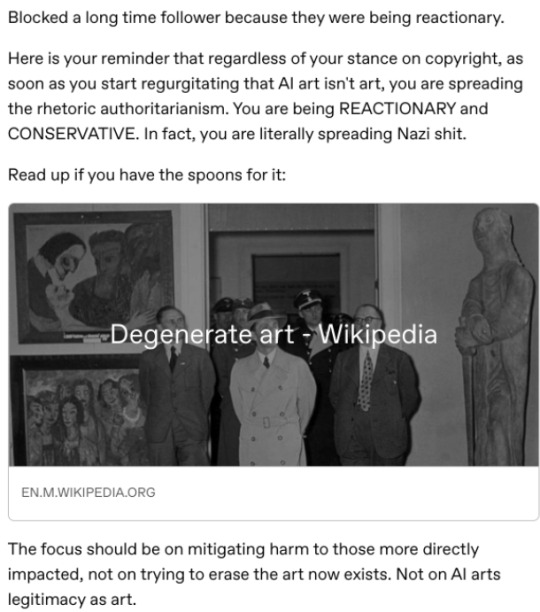
"blocked a long time follower because they were being reactionary. here is your reminder that regardless of your stance on copyright, as soon as you start regurgitating that ai art isn't art, you are spreding the rhetoric authoritarianism. you are being reactionary and conservative. in fact, you are literally spreading nazi shit. read up if you have the spoons for it: link here. the focus should be on mitigating harm to those more directly impacted, not on trying to erase the art now exist.s not on ai arts legitimacy as art." i'm not going to just sit here and say "oh wow weird take, point and laugh guys." that would be weird and frankly no better than places like r/fdc and r/systemscringe. so instead, we're gonna break this down: first off: what is degenerate art? well, let's check their wikipedia link.

"Degenerate art (German: Entartete Kunst) was a term adopted in the 1920s by the Nazi Party in Germany to describe modern art. During the dictatorship of Adolf Hitler, German modernist art, including many works of internationally renowned artists, was removed from state-owned museums and banned in Nazi Germany on the grounds that such art was an "insult to German feeling", un-German, Freemasonic, Jewish, or Communist in nature. Those identified as degenerate artists were subjected to sanctions that included being dismissed from teaching positions, being forbidden to exhibit or to sell their art, and in some cases being forbidden to produce art." okay, so op is claiming that dislike of ai art is comparable to the suppressing and banning of large amounts of art in nazi germany. which is a wild take. but why is it wild? 1. ai generators clearly do not experience much suppression or banning in places considering that they are an active threat to artists. 2. the main issue with ai image generation is that it is stealing from actual artists to create their images and putting people who have trained for years to hone their skills at risk of losing their jobs. this diminishes the amount of artists who will actually pursue a career in that field, thereby reducing the amount of actual artists and directly harming the art community. 3. a lot of people will lie about being ai "artists," attempting to claim the work as actual art. 4. the concept of comparing something like this to the holocaust in general is just... wildly insensitive, frankly. this should be common sense, but there seems to be a distinct lack of it here anyways. 5. people are allowed to have opinions? you can think ai art is a valid form of art. i'll think you're weird, but that's a valid opinion. some people don't think certain genres of music are art. some people don't think certain kinds of art should be considered art. for example, those pendulum paintings that were everywhere, and might still be everywhere. i saw a lot of discourse about those. some people did not consider them to be art, or at least not on par with things like large, dedicated paintings. does that make the people who have that opinion nazis? .....no????? there isn't a moral to this post. it probably shouldn't exist. i just saw this and needed to rant, and decided to make you all my unwitting victims, lol. if you agree with op, then... i don't know, have a nice day? maybe stop conflating something like ai art (which is basically inconsequential unless you are in a community it effects or witnessing a downgrade of media quality due to its usage in production) to the holocaust (one of if not the worst historical event to this day in history)? okay wait, i have a moral! you can dislike things or have an opinion without it having to be taken to the total extreme. for anyone who read through this entire thing, thank you for sticking around! have a cookie. 🍪
#ai art#tw discourse#discourse#syscourse#perhaps?#systems discoursing#tw#just tw for this entire post#stay safe out there folks#what tags does this even GO in????#ramblings#consider this my formal apology in advance to pluralblr#for this post#anyways i blocked op lol no i will not share their user
3 notes
·
View notes
Text
Idk how we can make this easier for people. I really don’t.
If you’re going to post any variation of ‘I hate/dislike x’ in the tag for x, that is rude. You are being rude. Your justifications don’t matter. Your caveats don’t matter. ‘I dislike x in a blorbo way’ means nothing. You are still contributing to the problem of ‘x hate in the x tag’. Stop it.
To go on to say ‘don’t hate on people for liking/disliking a character, people are allowed to have opinions, sweaties’ is just. incredibly condescending. and missing the point of what a lot of people in the x tag are complaining about. Nobody cares if you hate x as long as we don’t have to see you talking about how much or why or in what way you hate x. That’s it. That is our only problem here. With this specific thing. (the anon hate is another issue entirely)
We will gladly champion your right to hate x and to talk about hating x, just as long as we don’t have to see it. Don’t tag it. Tag it with ‘x critical’ or ‘anti-x’ or ‘x hate’ or literally anything else. This should not be a discussion we keep needing to have. This shouldn’t have been up for discussion in the first place. Its just fucking manners.
I know (or am guessing) the op intended that post to be a joke. That doesn’t change the fact that we’re fucking tired of this shit. In fact that actually kind of makes it worse. We’re tired. We’re so fucking tired of having to argue, constantly, against people who aren’t joking just so we can have some fucking peace and enjoy x like the rest of yall enjoy y and z.
I’m sorry to make an example of op, I’m not blocking them before I post this, so its possible/likely they’ll see this, but if you’re gonna do this shit in the tag then I think vagueing/not @/naming you is like. the most you’re owed.
#the dork is being a dork#izzy hands#the izcourse#and this goes for those of us on the izzy side too tbh#i know its tempting to tag ed/stede crit/hate/whatever but don't do that shit either#cause its rude and we KNOW its rude#but also just#they'll use that to point to and say 'well yall do it too'#so they can ignore every other argument we make#or ignore us pointing out other instances of harassment#like the anon hate#yall i'm not even old#i'm not 'fandom old'#i'm 27#but i'm too fucking old for this shit#we are ALL too fucking old for this shit#(or we should be)#(if you're old enough to be the target demographic for ofmd then you're too old for this shit too)#(and if you're not then you're too young for this shit)#(by which i mean to say you shouldn't be fucking watching ofmd)
27 notes
·
View notes
Note
As someone involved in the anti/proship discourse in the past, it’s exhausting. Both communities devote time to arguing with and complaining about each other, some centering their entire personalities around it. They refuse to leave each other alone despite how much they claim to despise one another. There are people as young as 13 and old as 40 involved in this ongoing 7-year-old discourse.
Honestly? None of this discourse would’ve started if people filtered or blocked works they disliked. Regardless of how you feel about a ship or character, you can’t control what other people enjoy in fiction. That’s why you have the power to curate your online experience instead of bullying people over liking what you don’t. As long as it's fictional, then no one is being harmed.
Fictional characters and ships aren’t a serious matter and shouldn’t be treated as such. None of it is worth doxxing people and bullying them into suicide. You ship what you want, and others ship what they want; it’s not complicated.
I don't mean this to choose a "side" between anti and proship—both have substantial issues, which is why I felt the need to make the term peacefic—but on the anti side, I do feel like there's often this strong desire for power and control. Control over other people's actions and posting habits, and in extreme cases control over their thoughts ("thought crimes"). Power and authority to be the ones who make the rules about what is or is not allowed to be written about, drawn, consumed in fiction.
Even if you take the stance that fiction can cause real world harm, you have to think about how such "rules" would be implemented and upheld in a practical sense. A single random individual on the internet does not have the power to control what millions of others are posting day by day, and even if they did, they would not have the time or energy to deal with it on that scale. Not to mention the question of why this particular individual should be the one who draws the line between what's problematic or not.
Then, the idea of giving power to others to allow them to moderate never guarantees that their interests will align with your own. They could decide that works about healing from trauma are too far, because they depict that trauma at all, even in a negative light. They could decide that queerness, or polyamory, or consensual kink is too far.
Ultimately, that kind of moderation isn't really feasible, in my opinion. And much harassment over fiction occurs as a way to feel in control of others in place of being able to directly stop them.
It would feel negligible for me to pretend that harassment solely comes from antis, though. Some proshippers take people's personal boundaries as an attack, as if saying "proship DNI" is the same as getting harassed by an anti. Blocking and filtering are important for the safety and comfort of all. No one owes you online interaction. A self-proclaimed anti who blocks all proshippers on sight without harassing them is well within their rights of curating their experience! Bullying them for their choice to avoid you isn't any better.
I think it's important for everyone to accept the fact that we are not in control of other's actions, regardless of how we feel about it. It would do some good for even individuals in favor of censorship to know this.
Thank you for the ask! ☮️📝
3 notes
·
View notes
Text
AI Generated Imagery, Theft and Transformative Works, The Willing Surrender of Artistic Freedom, and the value of the technology
Forewarning: I have a positive opinion on AI and its place in the creative world.
If you’re not familiar with AI Generated Imagery, or “Art”, it’s when an Artificially Intelligent model procedurally generates an image using millions (if not billions) of images as references. And some artists are irate because some of their art is amongst those billions of references, and they’re not getting their cut; And in an effort to spite their noses, are perfectly willing to throw away all of their creative freedoms and embrace DMCA strikes on crack.
Apologies for being intentionally inflammatory, but that’s just how things look from my perspective. We have this amazing new technology that can allow a single person to create the output of an entire studio, that can streamline the parts of creating that an artist doesn’t enjoy and finds tedious and allow them to focus on the parts of their craft that they actually enjoy, and empower independent creators, and there are people spitting on it and arguing that it should be made illegal, repercussions to these laws be damned.
We’re already seeing these repercussions on artist platforms that don’t allow AI Generated Imagery -- artists, whose art is somewhat generic looking and could be AI Generated, are being accused of posting AI Generated Imagery. And if any sort of legislation passes, these repercussions could spread to every platform. If somebody dislikes a piece of art you created for whatever reason, (say, you drew LGBT+-affirming fanart) they could register a complaint and get your art pulled down. And sure, you could fight it and get your art republished, but what about the third time it happens or the tenth time or the thirtieth time. Eventually you’re going to give up.
“But AI Art is theft!“
So... what are Let’s Plays then? What’s React Content? Why are those okay, and why is AI Generated Imagery different? Plenty of games are played and videos are reacted to without permission from the publishers and authors. Some Let’s Play content can act as free advertising, I suppose, but that’s mostly ancillary, and was entirely an incidental byproduct when the medium was starting out.
AI Generated Imagery isn’t theft, not as far as I can tell. It’s a mathematical projection, one based on countless points of seemingly random data extrapolated from a massive pool of information. A pool of information in which a single artist’s entire breadth of work may only make up a fraction of a percent.
This technology can revolutionize what a single person or a small team of creators could do. It can streamline tedious minutia, solidify half-imagined ideas, and create other opportunities that we couldn’t even fathom at the moment. Independent creators, now more than ever, will be able to create content that stands toe-to-toe with the giants of mainstream entertainment.
... And yes, Corporations have access to this technology too, and they may decide to gut their creative departments. But, regardless of whatever happens to OpenAI and Midsummer and Stable Diffusion, if that’s what will happen then that is what is going to happen. Disney has the resources to play ball with whatever laws are passed in regards to AI, they own more than enough content to produce whatever kind of AI model they want. There’s no stopping that. “We can’t rewind we’ve gone too far”.
That’s why it’s important to preserve the AI Models that are available to everyone. You have to decide who gets to utilize this technology: all of us, or just a handful of megacorporations that already own everything. There is no inbetween.
9 notes
·
View notes
Text
Doing my thing:
Immigrants who are allowed to commit crimes with weak or no sentencing do not actually improve as people and do not become peers worthy of respect.
If you're an globalist elite importing a bunch of people as a mix of cheap helot labor/demographic "prop" for pension systems/loyal vote bank/weapon against disliked native classes, would you want those people becoming "peers worthy of respect"? And whose definition of "improve"? There have been plenty of groups, historically, whose values would consider a young man who has increased his capacity to prey upon outgroups — intimidate them, beat them, loot their stuff, sexually exploit their young women — to have "improved."
High-level left/cultural-liberal leaders abandon their duty to protect and nurture the weak members of their own society.
What duty? Who says they owe anyone anything? And what do you mean "own society"? What about "equity"? Surely, if there's any duty to "nurture the weak members," then it applies equally to everybody within their area of administration, and who is weaker than the immigrant outsider? You can't be talking about favoring some people over others, just because of who their parents were or what side of an imaginary line they were born on, can you?
Cas Mudde gave a four-element definition of the contemporary "far-right" as combining "nationalism", "xenophobia", "law and order", and "welfare chauvinism." This sounds very much like "law and order" talk. And as these terms are used, well, welfare chauvinism "is the political notion that welfare benefits should be restricted to certain groups," and in current usage, that includes when the "certain groups" is "citizens of the country," or even just "legal residents of the country." If you don't think an undocumented immigrant who just crossed the border a moment ago is entitled to all the same benefits as the native born citizen? Then you're a welfare chauvinist. And surely the same should apply for the general regard of the high-level leadership? To favor "their own society" over other human beings would be inequity and bigotry.
And the way you talk about immigrants "improving" in other posts on this topic sounds a lot like assimilation, which, if you read the literature on this from the folks in Europe considered expert scholars on the topic, like Mudde and Kopeček, that counts as "xenophobia" under the above definition. Rejecting multiculturalism, expecting immigrants to conform to existing norms? That's another check on the "far-right extremist" checklist.
(I haven't been able to find either one again, but I remember reading a couple of things years back on this issue from a South Asian perspective. One was a Pakistani "grooming gang" member who'd been arrested — I don't remember which location — who attempted to defend his actions by arguing that his victims were "fair game". First, since the girls' fathers didn't care what happened to them, because they let them out of the house dressed like that, with their heads uncovered, and without a male escort — which, it goes without, no father who actually cares even slightly about his daughter would ever do. And second, afterwards not one member of the girls' extended family murdered one of his male relatives or raped one of his female relatives in retaliation, and, again without saying, this lack of clan feud proves the girls' clans don't think he did anything that bad.
The other was an Indian guy, wondering why western news outlets were making such a big deal out of this story, when clearly the people in places like Rotherham didn't care about what was happening. After all, not a single mob went into the Muslim neighborhoods beating random Muslims and burning down their shops, which it goes without saying is what they'd do if they did care about the rapes, so obviously the lack of such communal retaliation proves they don't care.)
And the way they define "nationalism"? I'm pretty sure you'd fit that too. So as far as the people in charge in places like the UK are concerned, you and your opinions on this topic are just another example of the "far-right extremism" that is a far greater threat — and a higher law enforcement priority — than any Muslim terrorist or ethnic "grooming gang."
There is no changing this so long as the current elite are in charge, and there's no way for the people to overthrow the current elite.
Weak natives get the shit beat out of them but aren't even able to fight back, and are forced to eat their rage.
Yes, and? If you're a post-national elite who hates the native lower classes, isn't this a good thing? And what's wrong with forcing them "eat their rage"? Classic pecking order — being able to hurt someone, make them submit, without them being able to retaliate is quite possibly the most basic way of proving your superiority and higher status. And you can keep forcing them to eat their rage, indefinitely, because they're powerless, and there's nothing they can do to you.
Without a firm, philosophically-liberal leadership to oppose the practice, less intellectually powerful natives may resort to racism to try to protect themselves...
Which gives you another excuse to crack down on them even harder, and feel morally virtuous about doing so. It still won't make them anything other than powerless peasants you can kick about however you like.
The "revenge immigration" model, the looking the other way on internal ethnic conflict because of the previous history of colonialism, is degrading to everyone involved.
Immigrants who are allowed to commit crimes with weak or no sentencing do not actually improve as people and do not become peers worthy of respect.
High-level left/cultural-liberal leaders abandon their duty to protect and nurture the weak members of their own society.
Lower-ranking members of left/cultural-liberal coalition bend themselves into rationalizing the wasteful suffering of weak natives, the act of which makes them worse as people.
Weak natives get the shit beat out of them but aren't even able to fight back, and are forced to eat their rage.
Without a firm, philosophically-liberal leadership to oppose the practice, less intellectually powerful natives may resort to racism to try to protect themselves... which degrades them by turning them against innocent people.
This is obviously disordered and it needs to end.
If there is no other model, then a new model for immigration and addressing former colonialism must be devised.
14 notes
·
View notes
Text
race & culture in fandom
For the past decade, English language fanwriting culture post the days of LiveJournal and Strikethrough has been hugely shaped by a handful of megafandoms that exploded across AO3 and tumblr – I’m talking Supernatural, Teen Wolf, Dr Who, the MCU, Harry Potter, Star Wars, BBC Sherlock – which have all been overwhelmingly white. I don’t mean in terms of the fans themselves, although whiteness also figures prominently in said fandoms: I mean that the source materials themselves feature very few POC, and the ones who are there tended to be done dirty by the creators.
Periodically, this has led POC in fandom to point out, extremely reasonably, that even where non-white characters do get central roles in various media properties, they’re often overlooked by fandom at large, such that the popular focus stays primarily on the white characters. Sometimes this happened (it was argued) because the POC characters were secondary to begin with and as such attracted less fan devotion (although this has never stopped fandoms from picking a random white gremlin from the background cast and elevating them to the status of Fave); at other times, however, there has been a clear trend of sidelining POC leads in favour of white alternatives (as per Finn, Poe and Rose Tico being edged out in Star Wars shipping by Hux, Kylo and Rey). I mention this, not to demonize individuals whose preferred ships happen to involve white characters, but to point out the collective impact these trends can have on POC in fandom spaces: it’s not bad to ship what you ship, but that doesn’t mean there’s no utility in analysing what’s popular and why through a racial lens.
All this being so, it feels increasingly salient that fanwriting culture as exists right now developed under the influence and in the shadow of these white-dominated fandoms – specifically, the taboo against criticizing or critiquing fics for any reason. Certainly, there’s a hell of a lot of value to Don’t Like, Don’t Read as a general policy, especially when it comes to the darker, kinkier side of ficwriting, and whether the context is professional or recreational, offering someone direct, unsolicited feedback on their writing style is a dick move. But on the flipside, the anti-criticism culture in fanwriting has consistently worked against fans of colour who speak out about racist tropes, fan ignorance and hurtful portrayals of living cultures. Voicing anything negative about works created for free is seen as violating a core rule of ficwriting culture – but as that culture has been foundationally shaped by white fandoms, white characters and, overwhelmingly, white ideas about what’s allowed and what isn’t, we ought to consider that all critical contexts are not created equal.
Right now, the rise of C-drama (and K-drama, and J-drama) fandoms is seeing a surge of white creators – myself included – writing fics for fandoms in which no white people exist, and where the cultural context which informs the canon is different to western norms. Which isn’t to say that no popular fandoms focused on POC have existed before now – K-pop RPF and anime fandoms, for example, have been big for a while. But with the success of The Untamed, more western fans are investing in stories whose plots, references, characterization and settings are so fundamentally rooted in real Chinese history and living Chinese culture that it’s not really possible to write around it. And yet, inevitably, too many in fandom are trying to do just that, treating respect for Chinese culture or an attempt to understand it as optional extras – because surely, fandom shouldn’t feel like work. If you’re writing something for free, on your own time, for your own pleasure, why should anyone else get to demand that you research the subject matter first?
Because it matters, is the short answer. Because race and culture are not made-up things like lightsabers and werewolves that you can alter, mock or misunderstand without the risk of hurting or marginalizing actual real people – and because, quite frankly, we already know that fandom is capable of drawing lines in the sand where it chooses. When Brony culture first reared its head (hah), the online fandom for My Little Pony – which, like the other fandoms we’re discussing here, is overwhelmingly female – was initially welcoming. It felt like progress, that so many straight men could identify with such a feminine show; a potential sign that maybe, we were finally leaving the era of mainstream hypermasculine fandom bullshit behind, at least in this one arena. And then, in pretty much the blink of an eye, things got overwhelmingly bad. Artists drawing hardcorn porn didn’t tag their works as adult, leading to those images flooding the public search results for a children’s show. Women were edged out of their own spaces. Bronies got aggressive, posting harsh, ugly criticism of artists whose gijinka interpretations of the Mane Six as humans were deemed insufficiently fuckable.
The resulting fandom conflict was deeply unpleasant, but in the end, the verdict was laid down loud and clear: if you cannot comport yourself like a decent fucking person – if your base mode of engagement within a fandom is to coopt it from the original audience and declare it newly cool only because you’re into it now; if you do not, at the very least, attempt to understand and respect the original context so as to engage appropriately (in this case, by acknowledging that the media you’re consuming was foundational to many women who were there before you and is still consumed by minors, and tagging your goddamn porn) – then the rest of fandom will treat you like a social biohazard, and rightly so.
Here’s the thing, fellow white people: when it comes to C-drama fandoms and other non-white, non-western properties? We are the Bronies.
Not, I hasten to add, in terms of toxic fuckery – though if we don’t get our collective shit together, I’m not taking that darkest timeline off the table. What I mean is that, by virtue of the whiteminding which, both consciously and unconsciously, has shaped current fan culture, particularly in terms of ficwriting conventions, we’re collectively acting as though we’re the primary audience for narratives that weren’t actually made with us in mind, being hostile dicks to Chinese and Chinese diaspora fans when they take the time to point out what we’re getting wrong. We’re bristling because we’ve conceived of ficwriting as a place wherein No Criticism Occurs without questioning how this culture, while valuable in some respects, also serves to uphold, excuse and perpetuate microaggresions and other forms of racism, lashing out or falling back on passive aggression when POC, quite understandably, talk about how they’re sick and tired of our bullshit.
An analogy: one of the most helpful and important tags on AO3 is the one for homophobia, not just because it allows readers to brace for or opt out of reading content they might find distressing, but because it lets the reader know that the writer knows what homophobia is, and is employing it deliberately. When this concept is tagged, I – like many others – often feel more able to read about it than I do when it crops up in untagged works of commercial fiction, film or TV, because I don’t have to worry that the author thinks what they’re depicting is okay. I can say definitively, “yes, the author knows this is messed up, but has elected to tell a messed up story, a fact that will be obvious to anyone who reads this,” instead of worrying that someone will see a fucked up story blind and think “oh, I guess that’s fine.” The contextual framing matters, is the point – which is why it’s so jarring and unpleasant on those rare occasions when I do stumble on a fic whose author has legitimately mistaken homophobic microaggressions for cute banter. This is why, in a ficwriting culture that otherwise aggressively dislikes criticism, the request to tag for a certain thing – while still sometimes fraught – is generally permitted: it helps everyone to have a good time and to curate their fan experience appropriately.
But when white and/or western fans fail to educate ourselves about race, culture and the history of other countries and proceed to deploy that ignorance in our writing, we’re not tagging for racism as a thing we’ve explored deliberately; we’re just being ignorant at best and hateful at worst, which means fans of colour don’t know to avoid or brace for the content of those works until they get hit in the face with microaggresions and/or outright racism. Instead, the burden is placed on them to navigate a minefield not of their creation: which fans can be trusted to write respectfully? Who, if they make an error, will listen and apologise if the error is explained? Who, if lived experience, personal translations or cultural insights are shared, can be counted on to acknowledge those contributions rather than taking sole credit? Too often, fans of colour are being made to feel like guests in their own house, while white fans act like a tone-policing HOA.
Point being: fandom and ficwriting cultures as they currently exist badly need to confront the implicit acceptance of racism and cultural bias that underlies a lot of community rules about engagement and criticism, and that needs to start with white and western fans. We don’t want to be the new Bronies, guys. We need to do better.
#race#racism#c-drama#fandom#fan wank#fandom wank#microaggresions#culture#the untamed#bronies#whiteness#ficwriting#fanwriting#cultural bias#discourse
6K notes
·
View notes
Note
"If you don't like the direction of the Magic brand, I would argue you don't understand what the Magic brand has been since its creation." I think it is ok to say that it is ok for the audience to have different opinions from the creators of magic about the game. I think it is a true fact that whenever some people make changes, some people will love it and some will hate it and most people will fall in between. But what you are saying is giving the vibe that if we disagree with you then it is not a matter of opinion but we are just ignorant about the brand. That makes me feel like that people with concerns is not welcomed. Don't mean to be toxic but really upset by this statement.
Let me start by apologizing if that post implied that people's concerns aren't welcome or that I'm not interested in hearing what people have to say. That couldn't be farther from the truth. A big part of this blog is having a place to post (and respond to) what players are thinking. It's absolutely fine to dislike some aspect and feel it deviates from what you believe Magic to be. We do things that *I* don't think we should do. (For example, I wouldn't have Walls be a creature type - it makes absolutely no sense flavorfully to me.)
The point I was trying to make is that Magic, as a game and as a brand, is bigger than any one individual. We collectively, as a whole, decide what Magic is. If we try something and the resounding answer from the entirety of the playerbase is "we don't like it", that thing stops being part of Magic. Ante, for example, was shunned by the vast majority of players and left the game.
My job, as well as all my coworkers, is to keep testing the boundaries to see what new things the Magic collective audience wants. What I was saying in the post is that exploration, that constant shifting of identity, that continual reinvention, is core to the essence of the Magic brand.
So when someone says they dislike something, that it isn't what they believe the game should be, my response is, well, let's see what the Magic collective thinks. If they agree with you, it'll go away. If they don't, it's probably going to stay.
I know it's hard when the Magic collective wants the game to be something that you personally don't want it to be, but what I've learned to respect over the years is the power that this force has on making Magic what it is. Magic twists and turns in ways I can never predict (and I've been making the game for over twenty-five years), but that's one of the things I love about it. It's a force than no one person controls. It allows it to become something larger than any one of us could create.
I'm really not trying to dismiss anyone's feelings. When people write in and are unhappy about something, I truly, honestly take it to heart, more than most of you might realize. Part of my job for the last twenty-five years has been to listen people who really dislike a choice that we've made and try to understand what exactly is making them unhappy. When I can act on that knowledge I do, but often times it comes down to them not liking something that makes other players happy.
That's why I wrote my article this week. I wanted to explain that the true power the players have is not in dictating what goes into the game (the Magic collective is going to do that), but choosing what parts of the game they embrace to make Magic the game they want it to be.
137 notes
·
View notes
Text
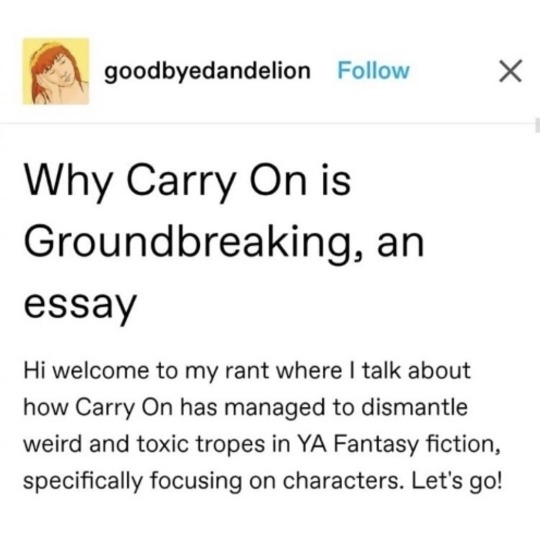
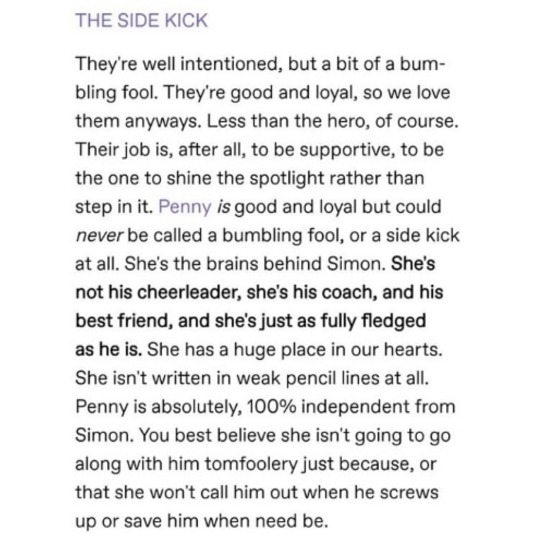
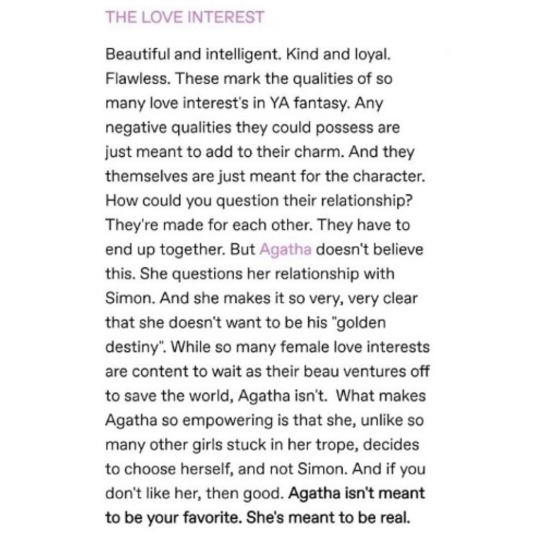
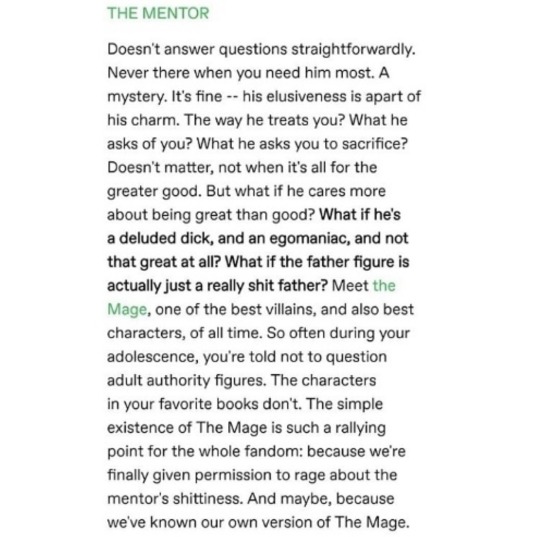
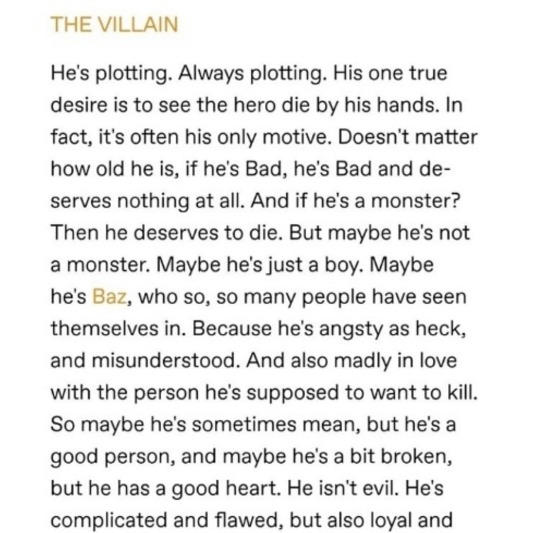
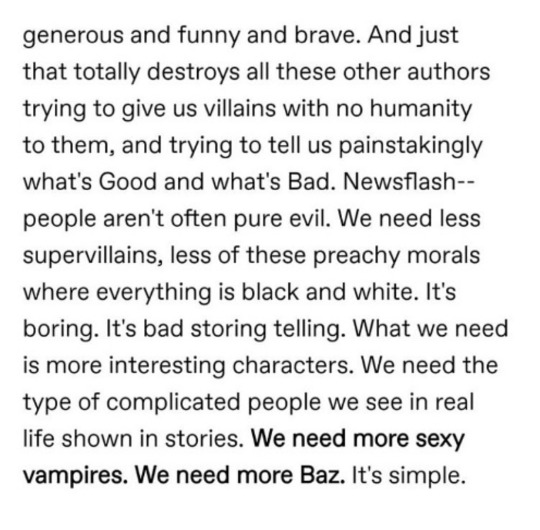
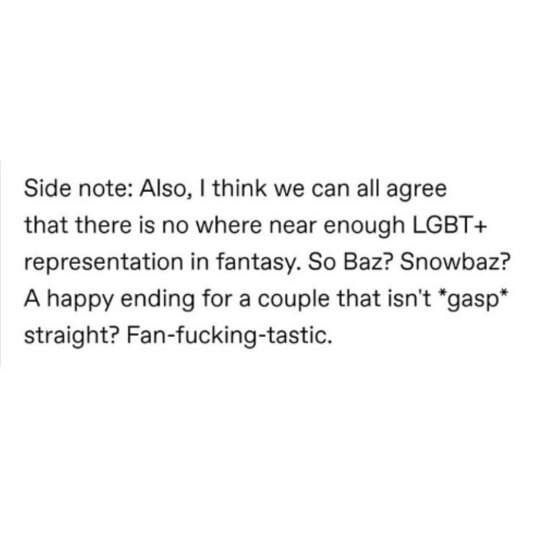
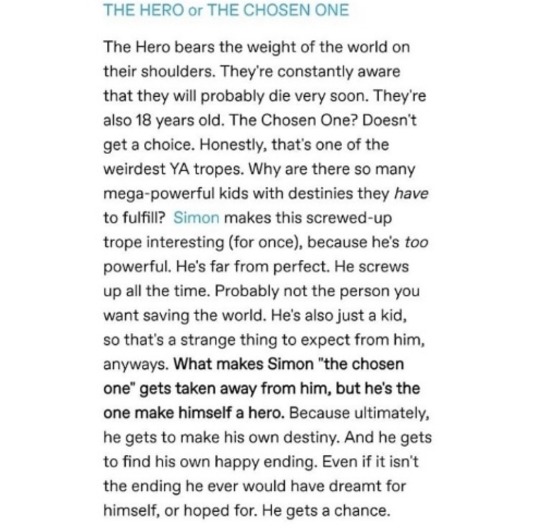

This excellent essay was posted by @goodbyedandelion and reposted on Instagram—however their account sadly seems gone now. But it is in rememberence of their Tumblr spirit that I post a continuation to their essay!
EVEN MORE Reasons Why Carry On is so groundbreaking as a YA Fantasy/Romance
Misconceptions/Character Complexity
A large topic in YA Contemporary is gossip, but I feel like fantasy doesn’t touch on this as much. Think of how others perceive one another in Carry On. Early on we learn that Simon, for example, saw Penny as different because of her race. But of course, we quickly know this isn’t true.
But what about Agatha? In Harry Potter, for example, Lavender Brown and other feminine characters are often looked down upon because of their femininity. We often as a culture perceive beauty as overcompensation for what’s inside. Sometimes Agatha is looked at in the same light in Carry On, but when we see things from her POV, we realize that Agatha is perhaps the smartest one there. Maybe she’s not Penny Bunce-smart, but she has the survival instincts that Penny lacks.
Agatha isn’t the only one. Baz looks cold and unfeeling from others’ POVs, but we quickly learn that he is a boy with a soft heart that’s been hardened by his past. Everyone thinks he cares about nothing but we know he cares about his mother and how she’d feel about him; his father and step-mother and siblings; Simon, of course; Bunce, in his own way; he even cares about flowered suits and dramatic entrances! We think Bunce is nerdy and perhaps annoying, but we learn she’s very sweet and like a mother to Simon. And the mage. Ugh, the mage. We think he cares about Simon but we learn that for every bit he cares about Simon, he cares about the war more.
Rowell doesn’t allow any character to be simple, stereotypical, or as they appear. My sister, for example, was saying that Baz sounded like a stereotypical gay man in the media. But he’s not, is he? He might love fashion but Rowell does not make him simple or stereotypical. Everyone is so complex, and she uses the multi-POV to not just show us their complexity but also the complexity of how they are viewed by others.
Woman on Woman Drama/Anger
For years and years, only one woman was allowed to have a true seat at the table in films. Take Indiana Jones, the original Avengers, and Star Wars for example. This woman was often made to be the sex appeal or romantic interest, but I’ll save that for another day. Because of there only being one spot, it set a precedent that women in media needed to fight with each other to take that spot, thus depriving us of women getting along!
At first, I was worried Rowell had fallen into this trap. Bunce thinks Agatha is simple and too feminine, Agatha thinks Bunce is a major pain in the ass. Their dislike for one another is complicated in that they’re essentially two different types of feminism battling it out, and half of their fight was about Simon and their roles in his life.
But in the end, Penny and Agatha create a relationship that exists outside of their relationship with Simon. Penny sees Agatha’s strength and resilience; Agatha recognizes Penny’s harsh exterior for what is is. When Agatha moves away, they text without his even knowing. Penny is the one that decides they need to check on and save her. In the end, penny and Agatha fight alongside one another.
Rowell didn’t just give us a feminine friendship—she showed us what we’ve been doing, and how to get from Point A to point B. I think it’s the most underrated part of the series.
True Friendship
It might sound bad, but I truly believe a lot of today’s media ruins the idea of friendship. I just feel like none of the portrayals are realistic. Friends are either joined at the hip and have never fought (toxic) or never get along (also toxic). The fact that Baz and Penny and Simon and Penny and Agatha and Penny can get into fights but still continue to love one another platonically is really heartwarming to me.
Trauma/Mental Illness
I remember getting to the end of Harry Potter and thinking “he went through all of that and we’re just supposed to leave him now?” We see some remnants in the most cursed play ever: The Cursed Child. But more than trauma we see someone who looks back on the days they risked their life everyday with *longing.* While that’s about the most Harry Potter thing Harry Potter has ever done (and the most canonical part of that play) it’s so unrealistic. You’re telling me Harry grew up with nothing and was an amazing father—minus a few spats with his son. You’re telling me Harry was able to hold it together emotionally after fighting for his life from ages 11-18 without a therapists help? You’re telling me Harry lost two father figures in the ministry of magic AND spent 7 years going through what amounted to a lesson titled “the government is corrupt” just to be a part of that government!?
Wayward son isn’t like that. Wayward Son shows us what happened to Simon afterwards, and it’s not peaches and cream. He had therapy, he quit therapy. A lot of us have been Simon on that couch, and we all needed the Baz in our life to drag us across a metaphorical America. Wayward Son is hands-down my favorite book. Realistic depictions of mental illness, check. Subverting our expectations of after the end, check. Reading it feels like taking a road trip, check.
As OP mentioned, Simon is a beloved chosen one because he’s just so wrong for the role. He’s not levelheaded where he should be, he’s bold in all the wrong places, he couldn’t possibly maintain a professional relationship with the coven. Meanwhile his super-hot enemy Baz was the absolute perfect choice to be chosen, but he was completely passed over. And part of this chalks up to how Simon became so powerful—fate isn’t twisting its whims this way and that. Simon is only chosen because he was a Petri dish experiment-gone-wrong baby. When Simon asks the fates why, really he should be asking the mage. There’s something delightful about the fact that Simon was made. The chosen one was made, and in the same process, so was the greatest threat.
De-escalation
I think it’s clear by now that Carry On is a great book, Simon Snow is an amazing series, and Rainbow Rowell sure can write. But I feel the need to point out that the end of Carry On wasn’t well-received by everyone. I recommend the series to everyone I know and some people are really disappointed you don’t get a big magical battle at the end. Some people think Simon filling in the humdrum was a cop out. But I disagree. I felt it was thrilling to witness a book where war was as stupid in fantasy land as it can be in real life. This is the first fantasy I’ve ever read where they find a better way to handle conflict than senseless fighting. It’s emotionally rewarding, to me, to see de-escalation. To see conflicts fixed before they start to be huge problems. It was a risky choice for an end, you have to admit. But Rowell pulls it off amazingly.
Nothing is Wrapped in a Bow
A day will never go by without me thinking about the fact that Simon Snow Salisbury doesn’t know who his parents are. Or how Baz will never know what exactly happened with his mother—whether she really ended herself to avoid vampirism and whether she would’ve done it to her too. We’ll never even quite understand the mage’s plan behind fix the humdrum and get an all powerful boy wizard on his side. Rowell doesn’t wrap everything up. She gives you closure as often as she gives you something to ponder. The ending of Harry Potter was so controversial, I think, because it spelled out so clearly much of what was happening. And what you didn’t learn in that epilogue, Rowling released later through Pottermore and interviews. That’s fine and dandy—but there’s something to be said for ending Simon Snow’s books with questions. Not infuriating questions but rather things that I’ll always ponder—that will shed new light on different situations depending on how I look at them. Rowell sets a precedent that you can fill in Simon’s world with your imagination while also reminding us that life doesn’t have endings. Not really, the way books to. Rowell is one of the few writers of today’s fantasy, I’d argue, who’s okay letting things go unanswered. There’s always a thread of fantasy and magic going. It’s something that will keep Simon alive in my heart for many, many years to come.
So yeah, that’s what I think about when I think about Simon Snow. It’s not nearly as coherent as the original post but I hope you enjoy it.
#carry on rainbow rowell#simon snow#simon snow series#baz grimm pitch#carry on#simon snow salisbury#baz#any way the wind blows#baz pitch supremacy#co/ws#simon snow supremacy#penny#penny bunce#shepard from omaha#shepard#agatha wellbelove#fiona pitch#lucy salisbury#awtwb#carry on wayward son#wayward son
616 notes
·
View notes
Text
Juts saw this post and again will double it my post
I want to speak out on a topic that has been really bothering and stressing me out. For several months now, I and my friends who don't even ship jegulus, but are just Regulus fans have been harassed by Jily shippers. And not just with hateful words, but with specific accusations of fascism.
I want to start by saying that fandoms are a place where people can express their creativity and interpret characters as they like. Fanfics, art, and shippings are forms of self-expression, and they don't have to conform to canon. It allows us to look at characters from different angles, develop alternative plots, and create something new. And I don't judge or persecute people for their favorite characters and ships.
I'm a huge Regulus fan even before the Jegulus ship came along. Regulus Black is a character I have a deep interest in for many reasons. Despite his limited appearance in the Harry Potter books, his story and character leave room for a lot of interpretation and thought. And I don't like it when people describe him as a regular Death Eater.
First, Jily fans often argue their dislike by saying that their ship is canonical( of course this is true and no one denies it) and James would never date a death eater. However, it should be remembered that fan art and shippings are inherently activities for the self and the soul. Even if a couple doesn't conform to "official" canon and never even met, it doesn't diminish the right of fans to create their own stories and interpretations.
Second Jegulus shippers are called misogynists.
But they may simply see these characters as interesting dynamics that catch their attention or interesting tropes that can be created. Choosing this ship doesn't necessarily mean they are intentionally excluding female characters and being negative towards them. Yes there are people among jegulus shippers who dislike Lily and exclude her from the story, but they are a minority. Plenty of jegulus shippers love Lily and also ship jily.
The charge of misogyny implies a conscious and systematic disregard for women or female characters. However, in most cases, Jegulus shippers simply enjoy a particular story or interaction between two male characters. This does not preclude an interest in or respect for female characters. Many shippers actively create and support content featuring female characters in other contexts or ships.
There is always a diversity of interests and preferences in fan circles. Not everyone likes the same characters or couples, and that's fine. However, to infer misogyny just based on someone's preference for a certain male couple without considering the overall context of a person's interests is wrong and unfair. Plus, I've seen thousands of Jily fans who were blatantly homophobic towards the marlily and pandalily enjoyers, and called James her only love, and erase her identity, leaving only her relationship with James.
Third, why calling the death eaters fascists is wrong and insulting to the actual victims of the tragedy.
Fascism as a political ideology and movement had specific historical roots and consequences, including brutal repression, genocide, and war. Death Eaters are fictional characters created by transphobic Rowling for a work of fiction, and their actions and motivations are part of a fictional universe.
Using historical examples of real-life suffering and tragedies to compare to fictional characters is disrespectful to those affected by real-life events. Historical tragedies such as the Holocaust require special respect and careful handling. And many Jewish content makers have already spoken out about it.
The kind of hate I've encountered as a Regulus fan is something I wouldn't wish on anyone. That being said, I've always loved jily, but after the hate, stupid accusations I've cooled off to them. You can't treat living people like that because of fictional characters. A lot of people don't care about canon written by a creepy transphobic woman, can you imagine?
Instead of wasting time on conflict and hate I suggest you create content on your favorite ships and leave other people alone. You have no idea how your hating can affect a person.
Not all shippers have the intention to demean or exclude other characters. Many of us simply love a particular dynamic and choose to explore it in our writing. This should not be taken as a threat or insult to other fans.
I love jegulus and jily, but my fav ship is dorlily and it saddens me that fans of the same fandom hate each other so much.
Not all shippers have the intent to demean or exclude other characters. Many of us simply love a particular dynamic and choose to explore it in our writing. This should not be taken as a threat or insult to other fans.
Leave other people alone. If u can't create content for your favorite ship and only can hate others its your f..king problem, it's unhealthy and childish.
I'm deeply sorry for jegulus artists and writers who got hate here and even death treats. I hope you will continue creating something that makes you happy.
OP was talking about literal hate, you can just politely ask "hey pls don't tag jily in this post, because...and your point" not harass real people and sending death treats to them. I saw plenty jily tags when trying to find dorlily content it's not a big deal , u can literally filter a tag lol
You can like ships without hating on other ships. Like ffs the jegulus hate is so mind boggling. What the fuck? God if you don't like it DON'T COMMENT ON IT MAYBE? Why is the hate necessary.
Jegulus is as beautiful as Jily. Both are really good ships. Most good jegulus ships don't hate on Lily. We all love Lily ok?
I am a multishipper; I ship jegulus, jily and when I can't decide which one I like more I go with jegulily. It's just very fucking weird to hate on something that brings people joy.
Go get a life.
Reminder: hating does not make you cool.
654 notes
·
View notes
Text
Anonymous asked: I enjoyed reading your posts about Napoleon’s death and it’s quite timely given its the 200th anniversary of his death this year in May. I was wondering, because you know a lot about military history (your served right? That’s cool to fly combat helicopters) and you live in France but aren’t French, what your take was on Napoleon and how do the French view him? Do they hail him as a hero or do they like others see him like a Hitler or a Stalin? Do you see him as a hero or a villain of history?
5 May 1821 was a memorable date because Napoleon, one of the most iconic figures in world history, died while in bitter exile on a remote island in the South Atlantic Ocean. Napoleon Bonaparte, as you know rose from obscure soldier to a kind of new Caesar, and yet he remains a uniquely controversial figure to this day especially in France. You raise interesting questions about Napoleon and his legacy. If I may reframe your questions in another way. Should we think of him as a flawed but essentially heroic visionary who changed Europe for the better? Or was he simply a military dictator, whose cult of personality and lust for power set a template for the likes of Hitler?

However one chooses to answer this question can we just - to get this out of the way - simply and definitively say that Napoleon was not Hitler. Not even close. No offence intended to you but this is just dumb ahistorical thinking and it’s a lazy lie. This comparison was made by some in the horrid aftermath of the Second World War but only held little currency for only a short time thereafter. Obviously that view didn’t exist before Hitler in the 19th Century and these days I don’t know any serious historian who takes that comparison seriously.
I confess I don’t have a definitive answer if he was a hero or a villain one way or the other because Napoleon has really left a very complicated legacy. It really depends on where you’re coming from.
As a staunch Brit I do take pride in Britain’s victorious war against Napoleonic France - and in a good natured way rubbing it in the noses of French friends at every opportunity I get because it’s in our cultural DNA and it’s bloody good fun (why else would we make Waterloo train station the London terminus of the Eurostar international rail service from its opening in 1994? Or why hang a huge gilded portrait of the Duke of Wellington as the first thing that greets any visitor to the residence of the British ambassador at the British Embassy?). On a personal level I take special pride in knowing my family ancestors did their bit on the battlefield to fight against Napoleon during those tumultuous times. However, as an ex-combat veteran who studied Napoleonic warfare with fan girl enthusiasm, I have huge respect for Napoleon as a brilliant military commander. And to makes things more weird, as a Francophile resident of who loves living and working in France (and my partner is French) I have a grudging but growing regard for Napoleon’s political and cultural legacy, especially when I consider the current dross of political mediocrity on both the political left and the right. So for me it’s a complicated issue how I feel about Napoleon, the man, the soldier, and the political leader.
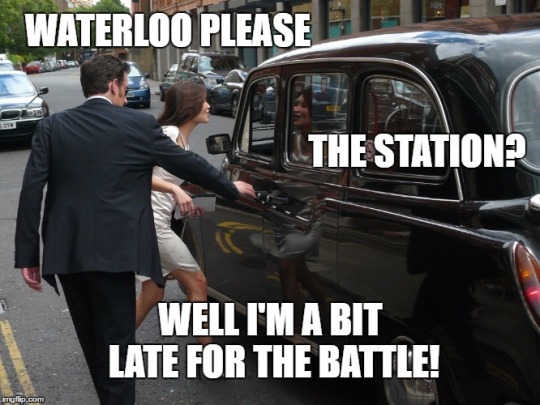
If it’s not so straightforward for me to answer the for/against Napoleon question then it It’s especially true for the French, who even after 200 years, still have fiercely divided opinions about Napoleon and his legacy - but intriguingly, not always in clear cut ways.
I only have to think about my French neighbours in my apartment building to see how divisive Napoleon the man and his legacy is. Over the past year or so of the Covid lockdown we’ve all gotten to know each other better and we help each other. Over the Covid year we’ve gathered in the inner courtyard for a buffet and just lifted each other spirits up.
One of my neighbours, a crusty old ex-general in the army who has an enviable collection of military history books that I steal, liberate, borrow, often discuss military figures in history like Napoleon over our regular games of chess and a glass of wine. He is from very old aristocracy of the ancien regime and whose family suffered at the hands of ‘madame guillotine’ during the French Revolution. They lost everything. He has mixed emotions about Napoleon himself as an old fashioned monarchist. As a military man he naturally admires the man and the military genius but he despises the secularisation that the French Revolution ushered in as well as the rise of the haute bourgeois as middle managers and bureaucrats by the displacement of the aristocracy.
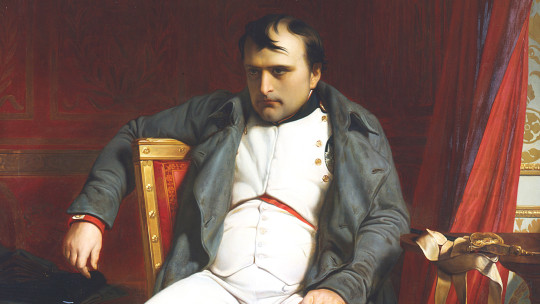
Another retired widowed neighbour I am close to, and with whom I cook with often and discuss art, is an active arts patron and ex-art gallery owner from a very wealthy family that came from the new Napoleonic aristocracy - ie the aristocracy of the Napoleonic era that Napoleon put in place - but she is dismissive of such titles and baubles. She’s a staunch Republican but is happy to concede she is grateful for Napoleon in bringing order out of chaos. She recognises her own ambivalence when she says she dislikes him for reintroducing slavery in the French colonies but also praises him for firmly supporting Paris’s famed Comédie-Française of which she was a past patron.
Another French neighbour, a senior civil servant in the Elysée, is quite dismissive of Napoleon as a war monger but is grudgingly grateful for civil institutions and schools that Napoleon established and which remain in place today.
My other neighbours - whether they be French families or foreign expats like myself - have similarly divisive and complicated attitudes towards Napoleon.

In 2010 an opinion poll in France asked who was the most important man in French history. Napoleon came second, behind General Charles de Gaulle, who led France from exile during the German occupation in World War II and served as a postwar president.
The split in French opinion is closely mirrored in political circles. The divide is generally down political party lines. On the left, there's the 'black legend' of Bonaparte as an ogre. On the right, there is the 'golden legend' of a strong leader who created durable institutions.
Jacques-Olivier Boudon, a history professor at Paris-Sorbonne University and president of the Napoléon Institute, once explained at a talk I attended that French public opinion has always remained deeply divided over Napoleon, with, on the one hand, those who admire the great man, the conqueror, the military leader and, on the other, those who see him as a bloodthirsty tyrant, the gravedigger of the revolution. Politicians in France, Boudon observed, rarely refer to Napoleon for fear of being accused of authoritarian temptations, or not being good Republicans.

On the left-wing of French politics, former prime minister Lionel Jospin penned a controversial best selling book entitled “the Napoleonic Evil” in which he accused the emperor of “perverting the ideas of the Revolution” and imposing “a form of extreme domination”, “despotism” and “a police state” on the French people. He wrote Napoleon was "an obvious failure" - bad for France and the rest of Europe. When he was booted out into final exile, France was isolated, beaten, occupied, dominated, hated and smaller than before. What's more, Napoleon smothered the forces of emancipation awakened by the French and American revolutions and enabled the survival and restoration of monarchies. Some of the legacies with which Napoleon is credited, including the Civil Code, the comprehensive legal system replacing a hodgepodge of feudal laws, were proposed during the revolution, Jospin argued, though he acknowledges that Napoleon actually delivered them, but up to a point, "He guaranteed some principles of the revolution and, at the same time, changed its course, finished it and betrayed it," For instance, Napoleon reintroduced slavery in French colonies, revived a system that allowed the rich to dodge conscription in the military and did nothing to advance gender equality.
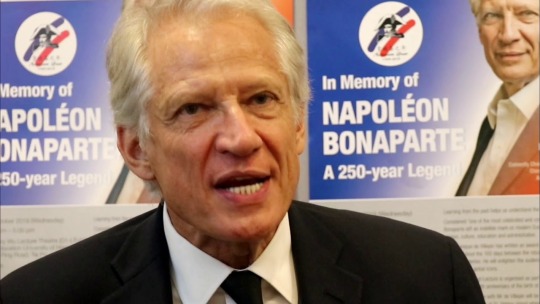
At the other end of the spectrum have been former right-wing prime minister Dominique de Villepin, an aristocrat who was once fancied as a future President, a passionate collector of Napoleonic memorabilia, and author of several works on the subject. As a Napoleonic enthusiast he tells a different story. Napoleon was a saviour of France. If there had been no Napoleon, the Republic would not have survived. Advocates like de Villepin point to Napoleon’s undoubted achievements: the Civil Code, the Council of State, the Bank of France, the National Audit office, a centralised and coherent administrative system, lycées, universities, centres of advanced learning known as école normale, chambers of commerce, the metric system, and an honours system based on merit (which France has to this day). He restored the Catholic faith as the state faith but allowed for the freedom of religion for other faiths including Protestantism and Judaism. These were ambitions unachieved during the chaos of the revolution. As it is, these Napoleonic institutions continue to function and underpin French society. Indeed, many were copied in countries conquered by Napoleon, such as Italy, Germany and Poland, and laid the foundations for the modern state.
Back in 2014, French politicians and institutions in particular were nervous in marking the 200th anniversary of Napoleon's exile. My neighbours and other French friends remember that the commemorations centred around the Chateau de Fontainebleau, the traditional home of the kings of France and was the scene where Napoleon said farewell to the Old Guard in the "White Horse Courtyard" (la cour du Cheval Blanc) at the Palace of Fontainebleau. (The courtyard has since been renamed the "Courtyard of Goodbyes".) By all accounts the occasion was very moving. The 1814 Treaty of Fontainebleau stripped Napoleon of his powers (but not his title as Emperor of the French) and sent him into exile on Elba. The cost of the Fontainebleau "farewell" and scores of related events over those three weekends was shouldered not by the central government in Paris but by the local château, a historic monument and UNESCO World Heritage site, and the town of Fontainebleau.
While the 200th anniversary of the French Revolution that toppled the monarchy and delivered thousands to death by guillotine was officially celebrated in 1989, Napoleonic anniversaries are neither officially marked nor celebrated. For example, over a decade ago, the president and prime minister - at the time, Jacques Chirac and Dominque de Villepin - boycotted a ceremony marking the 200th anniversary of the battle of Austerlitz, Napoleon's greatest military victory. Both men were known admirers of Napoleon and yet political calculation and optics (as media spin doctors say) stopped them from fully honouring Napoleon’s crowning military glory.
Optics is everything. The division of opinion in France is perhaps best reflected in the fact that, in a city not shy of naming squares and streets after historical figures, there is not a single “Boulevard Napoleon” or “Place Napoleon” in Paris. On the streets of Paris, there are just two statues of Napoleon. One stands beneath the clock tower at Les Invalides (a military hospital), the other atop a column in the Place Vendôme. Napoleon's red marble tomb, in a crypt under the Invalides dome, is magnificent, perhaps because his remains were interred there during France's Second Empire, when his nephew, Napoleon III, was on the throne.

There are no squares, nor places, nor boulevards named for Napoleon but as far as I know there is one narrow street, the rue Bonaparte, running from the Luxembourg Gardens to the River Seine in the old Latin Quarter. And, that, too, is thanks to Napoleon III. For many, and I include myself, it’s a poor return by the city to the man who commissioned some of its most famous monuments, including the Arc de Triomphe and the Pont des Arts over the River Seine.
It's almost as if Napoleon Bonaparte is not part of the national story.
How Napoleon fits into that national story is something historians, French and non-French, have been grappling with ever since Napoleon died. The plain fact is Napoleon divides historians, what precisely he represents is deeply ambiguous and his political character is the subject of heated controversy. It’s hard for historians to sift through archival documents to make informed judgements and still struggle to separate the man from the myth.
One proof of this myth is in his immortality. After Hitler’s death, there was mostly an embarrassed silence; after Stalin’s, little but denunciation. But when Napoleon died on St Helena in 1821, much of Europe and the Americas could not help thinking of itself as a post-Napoleonic generation. His presence haunts the pages of Stendhal and Alfred de Vigny. In a striking and prescient phrase, Chateaubriand prophesied the “despotism of his memory”, a despotism of the fantastical that in many ways made Romanticism possible and that continues to this day.
The raw material for the future Napoleon myth was provided by one of his St Helena confidants, the Comte de las Cases, whose account of conversations with the great man came out shortly after his death and ran in repeated editions throughout the century. De las Cases somehow metamorphosed the erstwhile dictator into a herald of liberty, the emperor into a slayer of dynasties rather than the founder of his own. To the “great man” school of history Napoleon was grist to their mill, and his meteoric rise redefined the meaning of heroism in the modern world.
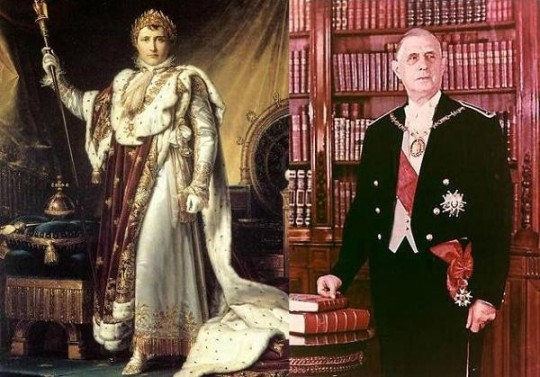
The Marxists, for all their dislike of great men, grappled endlessly with the meaning of the 18th Brumaire; indeed one of France’s most eminent Marxist historians, George Lefebvre, wrote what arguably remains the finest of all biographies of him.
It was on this already vast Napoleon literature, a rich terrain for the scholar of ideas, that the great Dutch historian Pieter Geyl was lecturing in 1940 when he was arrested and sent to Buchenwald. There he composed what became one of the classics of historiography, a seminal book entitled Napoleon: For and Against, which charted how generations of intellectuals had happily served up one Napoleon after another. Like those poor souls who crowded the lunatic asylums of mid-19th century France convinced that they were Napoleon, generations of historians and novelists simply could not get him out of their head.
The debate runs on today no less intensely than in the past. Post-Second World War Marxists would argue that he was not, in fact, revolutionary at all. Eric Hobsbawm, a notable British Marxist historian, argued that ‘Most-perhaps all- of his ideas were anticipated by the Revolution’ and that Napoleon’s sole legacy was to twist the ideals of the French Revolution, and make them ‘more conservative, hierarchical and authoritarian’.

This contrasts deeply with the view William Doyle holds of Napoleon. Doyle described Bonaparte as ‘the Revolution incarnate’ and saw Bonaparte’s humbling of Europe’s other powers, the ‘Ancien Regimes’, as a necessary precondition for the birth of the modern world. Whatever one thinks of Napoleon’s character, his sharp intellect is difficult to deny. Even Paul Schroeder, one of Napoleon’s most scathing critics, who condemned his conduct of foreign policy as a ‘criminal enterprise’ never denied Napoleon’s intellect. Schroder concluded that Bonaparte ‘had an extraordinary capacity for planning, decision making, memory, work, mastery of detail and leadership’. The question of whether Napoleon used his genius for the betterment or the detriment of the world, is the heart of the debate which surrounds him.
France's foremost Napoleonic scholar, Jean Tulard, put forward the thesis that Bonaparte was the architect of modern France. "And I would say also pâtissier [a cake and pastry maker] because of the administrative millefeuille that we inherited." Oddly enough, in North America the multilayered mille-feuille cake is called ‘a napoleon.’ Tulard’s works are essential reading of how French historians have come to tackle the question of Napoleon’s legacy. He takes the view that if Napoleon had not crushed a Royalist rebellion and seized power in 1799, the French monarchy and feudalism would have returned, Tulard has written. "Like Cincinnatus in ancient Rome, Napoleon wanted a dictatorship of public salvation. He gets all the power, and, when the project is finished, he returns to his plough." In the event, the old order was never restored in France. When Louis XVIII became emperor in 1814, he served as a constitutional monarch.
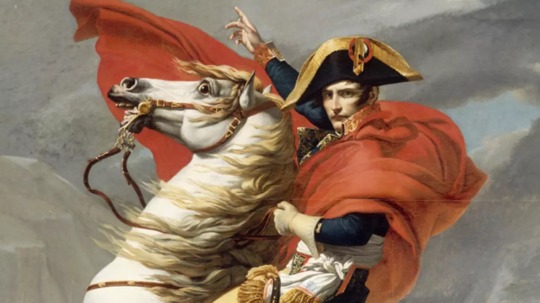
In England, until recently the views on Napoleon have traditionally less charitable and more cynical. Professor Christopher Clark, the notable Cambridge University European historian, has written. "Napoleon was not a French patriot - he was first a Corsican and later an imperial figure, a journey in which he bypassed any deep affiliation with the French nation," Clark believed Napoleon’s relationship with the French Revolution is deeply ambivalent.
Did he stabilise the revolutionary state or shut it down mercilessly? Clark believes Napoleon seems to have done both. Napoleon rejected democracy, he suffocated the representative dimension of politics, and he created a culture of courtly display. A month before crowning himself emperor, Napoleon sought approval for establishing an empire from the French in a plebiscite; 3,572,329 voted in favour, 2,567 against. If that landslide resembles an election in North Korea, well, this was no secret ballot. Each ‘yes’ or ‘no’ was recorded, along with the name and address of the voter. Evidently, an overwhelming majority knew which side their baguette was buttered on.
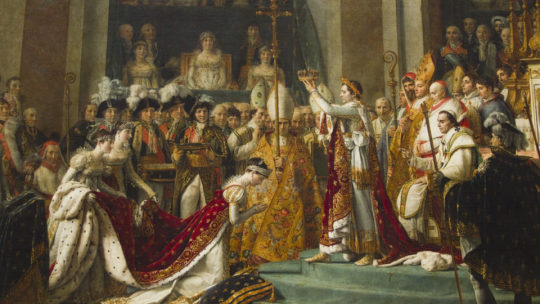
His extravagant coronation in Notre Dame in December 1804 cost 8.5 million francs (€6.5 million or $8.5 million in today's money). He made his brothers, sisters and stepchildren kings, queens, princes and princesses and created a Napoleonic aristocracy numbering 3,500. By any measure, it was a bizarre progression for someone often described as ‘a child of the Revolution.’ By crowning himself emperor, the genuine European kings who surrounded him were not convinced. Always a warrior first, he tried to represent himself as a Caesar, and he wears a Roman toga on the bas-reliefs in his tomb. His coronation crown, a laurel wreath made of gold, sent the same message. His icon, the eagle, was also borrowed from Rome. But Caesar's legitimacy depended on military victories. Ultimately, Napoleon suffered too many defeats.
These days Napoleon the man and his times remain very much in fashion and we are living through something of a new golden age of Napoleonic literature. Those historians who over the past decade or so have had fun denouncing him as the first totalitarian dictator seem to have it all wrong: no angel, to be sure, he ended up doing far more at far less cost than any modern despot. In his widely praised 2014 biography, Napoleon the Great, Andrew Roberts writes: “The ideas that underpin our modern world - meritocracy, equality before the law, property rights, religious toleration, modern secular education, sound finances, and so on - were championed, consolidated, codified and geographically extended by Napoleon. To them he added a rational and efficient local administration, an end to rural banditry, the encouragement of science and the arts, the abolition of feudalism and the greatest codification of laws since the fall of the Roman empire.”
Roberts partly bases his historical judgement on newly released historical documents about Napoleon that were only available in the past decade and has proved to be a boon for all Napoleonic scholars. Newly released 33,000 letters Napoleon wrote that still survive are now used extensively to illustrate the astonishing capacity that Napoleon had for compartmentalising his mind - he laid down the rules for a girls’ boarding school on the eve of the battle of Borodino, for example, and the regulations for Paris’s Comédie-Française while camped in the Kremlin. They also show Napoleon’s extraordinary capacity for micromanaging his empire: he would write to the prefect of Genoa telling him not to allow his mistress into his box at the theatre, and to a corporal of the 13th Line regiment warning him not to drink so much.
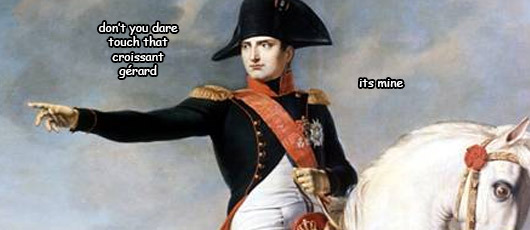
For me to have my own perspective on Napoleon is tough. The problem is that nothing with Napoleon is simple, and almost every aspect of his personality is a maddening paradox. He was a military genius who led disastrous campaigns. He was a liberal progressive who reinstated slavery in the French colonies. And take the French Revolution, which came just before Napoleon’s rise to power, his relationship with the French Revolution is deeply ambivalent. Did he stabilise it or shut it down? I agree with those British and French historians who now believe Napoleon seems to have done both.
On the one hand, Napoleon did bring order to a nation that had been drenched in blood in the years after the Revolution. The French people had endured the crackdown known as the 'Reign of Terror', which saw so many marched to the guillotine, as well as political instability, corruption, riots and general violence. Napoleon’s iron will managed to calm the chaos. But he also rubbished some of the core principles of the Revolution. A nation which had boldly brought down the monarchy had to watch as Napoleon crowned himself Emperor, with more power and pageantry than Louis XVI ever had. He also installed his relatives as royals across Europe, creating a new aristocracy. In the words of French politician and author Lionel Jospin, 'He guaranteed some principles of the Revolution and at the same time, changed its course, finished it and betrayed it.'
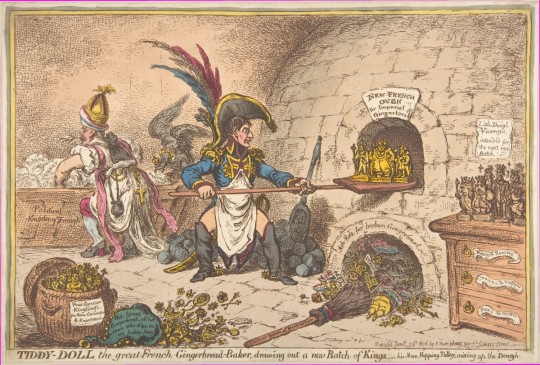
He also had a feared henchman in the form of Joseph Fouché, who ran a secret police network which instilled dread in the population. Napoleon’s spies were everywhere, stifling political opposition. Dozens of newspapers were suppressed or shut down. Books had to be submitted for approval to the Commission of Revision, which sounds like something straight out of George Orwell. Some would argue Hitler and Stalin followed this playbook perfectly. But here come the contradictions. Napoleon also championed education for all, founding a network of schools. He championed the rights of the Jews. In the territories conquered by Napoleon, laws which kept Jews cooped up in ghettos were abolished. 'I will never accept any proposals that will obligate the Jewish people to leave France,' he once said, 'because to me the Jews are the same as any other citizen in our country.'
He also, crucially, developed the Napoleonic Code, a set of laws which replaced the messy, outdated feudal laws that had been used before. The Napoleonic Code clearly laid out civil laws and due processes, establishing a society based on merit and hard work, rather than privilege. It was rolled out far beyond France, and indisputably helped to modernise Europe. While it certainly had its flaws – women were ignored by its reforms, and were essentially regarded as the property of men – the Napoleonic Code is often brandished as the key evidence for Napoleon’s progressive credentials. In the words of historian Andrew Roberts, author of Napoleon the Great, 'the ideas that underpin our modern world… were championed by Napoleon'.

What about Napoleon’s battlefield exploits? If anything earns comparisons with Hitler, it’s Bonaparte’s apparent appetite for conquest. His forces tore down republics across Europe, and plundered works of art, much like the Nazis would later do. A rampant imperialist, Napoleon gleefully grabbed some of the greatest masterpieces of the Renaissance, and allegedly boasted, 'the whole of Rome is in Paris.'
Napoleon has long enjoyed a stellar reputation as a field commander – his capacities as a military strategist, his ability to read a battle, the painstaking detail with which he made sure that he cold muster a larger force than his adversary or took maximum advantage of the lie of the land – these are stuff of the military legend that has built up around him. It is not without its critics, of course, especially among those who have worked intensively on the later imperial campaigns, in the Peninsula, in Russia, or in the final days of the Empire at Waterloo.
Doubts about his judgment, and allegations of rashness, have been raised in the context of some of his victories, too, most notably, perhaps, at Marengo. But overall his reputation remains largely intact, and his military campaigns have been taught in the curricula of military academies from Saint-Cyr to Sandhurst, alongside such great tacticians as Alexander the Great and Hannibal.
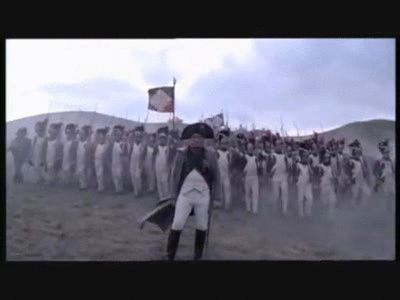
Historians may query his own immodest opinion that his presence on the battlefield was worth an extra forty thousand men to his cause, but it is clear that when he was not present (as he was not for most of the campaign in Spain) the French were wont to struggle. Napoleon understood the value of speed and surprise, but also of structures and loyalties. He reformed the army by introducing the corps system, and he understood military aspirations, rewarding his men with medals and honours; all of which helped ensure that he commanded exceptional levels of personal loyalty from his troops.
Yet, I do find it hard to side with the more staunch defenders of Napoleon who say his reputation as a war monger is to some extent due to British propaganda at the time. They will point out that the Napoleonic Wars, far from being Napoleon’s fault, were just a continuation of previous conflicts that arose thanks to the French Revolution. Napoleon, according to this analysis, inherited a messy situation, and his only real crime was to be very good at defeating enemies on the battlefield. I think that is really pushing things too far. I mean deciding to invade Spain and then Russia were his decisions to invade and conquer.
He was, by any measure, a genius of war. Even his nemesis the Duke of Wellington, when asked who the greatest general of his time was, replied: 'In this age, in past ages, in any age, Napoleon.'
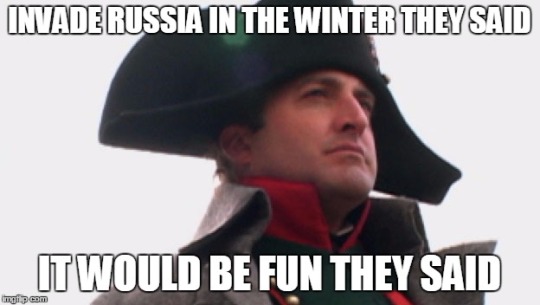
I will qualify all this and agree that Napoleon’s Russian campaign has been rightly held up as a fatal folly which killed so many of his men, but this blunder – epic as it was – should not be compared to Hitler’s wars of evil aggression. Most historians will agree that comparing the two men is horribly flattering to Hitler - a man fuelled by visceral, genocidal hate - and demeaning to Napoleon, who was a product of Enlightenment thinking and left a legacy that in many ways improved Europe.
Napoleon was, of course, no libertarian, and no pluralist. He would tolerate no opposition to his rule, and though it was politicians and civilians who imposed his reforms, the army was never far behind. But comparisons with twentieth-century dictators are well wide of the mark. While he insisted on obedience from those he administered, his ideology was based not on division or hatred, but on administrative efficiency and submission to the law. And the state he believed in remained stubbornly secular.
In Catholic southern Europe, of course, that was not an approach with which it was easy to acquiesce; and disorder, insurgency and partisan attacks can all be counted among the results. But these were principles on which the Emperor would not and could not give ground. If he had beliefs they were not religious or spiritual beliefs, but the secular creed of a man who never forgot that he owed both his military career and his meteoric political rise to the French Revolution, and who never quite abandoned, amidst the monarchical symbolism and the court pomp of the Empire, the republican dreams of his youth. When he claimed, somewhat ambiguously, after the coup of 18 Brumaire that `the Revolution was over’, he almost certainly meant that the principles of 1789 had at last been consummated, and that the continuous cycle of violence of the 1790s could therefore come to an end.
When the Empire was declared in 1804, the wording, again, might seem curious, the French being informed that the `Republic would henceforth be ruled by an Emperor’. Napoleon might be a dictator, but a part at least of him remained a son of the Enlightenment.
The arguments over Napoleon’s status will continue - and that in itself is a testament to the power of one of the most complex figures ever to straddle the world’s stage.
Will the fascination with Napoleon continue for another 200 years?
In France, at least, enthusiasm looks set to diminish. Napoleon and his exploits are scarcely mentioned in French schools anymore. Stéphane Guégan, curator of the Musée d'Orsay in Paris, which, among other First Empire artworks, houses a plaster model of Napoleon dressed as a Roman emperor astride a horse, has described France's fascination with him as ‘a national illness.’ He believes that the people who met him were fascinated by his charm. And today, even the most hostile to Napoleon also face this charm. So there is a difficulty to apprehend the duality of this character. As he wrote, “He was born from the revolution, he extended and finished it, and after 1804 he turns into a despot, a dictator.”

In France, Guégan aptly observes, there is a kind of nostalgia, not for dictatorship but for strong leaders. "Our age is suffering a lack of imagination and political utopia,"
Here I think Guégan is onto something. Napoleon’s stock has always risen or fallen according to the vicissitudes of world events and fortunes of France itself.
In the past, history was the study of great men and women. Today the focus of teaching is on trends, issues and movements. France in 1800 is no longer about Louis XVI and Napoleon Bonaparte. It's about the industrial revolution. Man does not make history. History makes men. Or does it? The study of history makes a mug out of those with such simple ideological driven conceits.
For two hundred years on, the French still cannot agree on whether Napoleon was a hero or a villain as he has swung like a pendulum according to the gravitational pull of historical events and forces.
The question I keep asking of myself and also to French friends with whom I discuss such things is what kind of Napoleon does our generation need?
Thanks for your question.
#question#ask#napoleon#french#french history#history#military history#bonaparte#france#historiography#republic#historians#personal
417 notes
·
View notes
Text
Everything You Need to Know About Pagan Deity

As you’ve probably guessed by now, there are many, many, many different approaches to deity within the wider pagan community. While it would be impossible to summarize all of these different perspectives in a single blog post, this post contains some common themes and best practices that are more or less universal and can be adapted to fit whatever system you choose to work with.
In my Baby Witch Bootcamp series, I talk about the “Four R’s” of working with spiritual beings, including deities: respect, research, reciprocity, and relationship. However, when it comes to gods and goddesses specifically, I think it’s important to include a fifth “R” — receptivity.
If you’re completely new to this kind of work and want to avoid making rookie mistakes and/or pissing off powerful spiritual forces, sticking to the Five R’s of Deity Relationships is a good place to start. The Five R’s are:
Respect. It’s always a good idea to have a healthy respect for the powers you choose to connect with, whether you see those powers as literal gods and goddesses or as archetypes within the collective unconscious (see below). While not every ritual needs to be incredibly formal and structured, you should always conduct yourself with an air of respect and reverence when connecting with deity. There’s no need to humble yourself to the point of cowering before the gods (and in fact, this kind of behavior is a turnoff for many deities), but you should strive to be polite and follow your system’s proper protocol for things like cleansing, offerings, and prayers.
Research. I am of the opinion that you should do serious research into a god or goddess before any attempt to make contact with them. This can be controversial, but in my own experience things seem to go more smoothly when I know what I’m doing. Books are really the way to go for this — the Internet can be useful for connecting with other worshipers and hearing their stories, but it isn’t a good source for nonbiased factual information. I recommend starting with academic sources written by secular experts for a purely historical account that won’t be colored by personal religious experience. Once you have a decent understanding of the basic historical context, look for books by pagan authors who have experience working with this deity. These sources will give you a framework for your own interactions with them.
Reciprocity. As we’ve discussed before, reciprocity is a core value of virtually every pagan tradition. Reciprocity is a mutual positive exchange where all parties benefit in some way, and this quality forms the backbone of all healthy relationships with deity. While we benefit from connecting with the gods, the gods also benefit from our worship. Upholding reciprocity in your relationships with deity means making regular offerings to show your appreciation as well as living in a way that your god or goddess approves of.
Relationship. At the end of the day, connecting with a god or goddess is about creating a healthy, fulfilling relationship. Like any relationship, it takes time and effort to keep the connection alive. The gods are living, thinking, feeling beings just like you and me, though on a much larger scale. Just like you and me, they have likes and dislikes and require certain things from those who want to work closely with them. Try to approach the gods as individuals, and connect with them as you would with another person. This will naturally lead to much more authentic and organic relationships.
Receptivity. To be receptive is to be open and ready to receive whatever comes your way — this is an essential quality for anyone who is serious about connecting with a god or goddess. Connecting with the gods means allowing them a place in your life, whatever they choose to bring with them. It means forming a relationship with them on their terms, and that requires us to give up a certain degree of control. While you should never feel afraid or completely out of control when connecting with deity (if you do, stop contacting that deity immediately), you may very well experience things you did not expect or ask for. Be prepared for these surprises, and understand that when the gods surprise us in this way, they do it in order to help us grow. Let go of any preconceived ideas about what a relationship with this deity “should” look like, and instead let it unfold naturally.
Though there is much more to working with deity than just these values, keeping these values in mind will get you started out on the right foot in your relationships with the gods.
Deity or Archetype?
As odd as it may sound, not everyone who connects with the gods through study and ritual believes those gods to be literal spiritual beings. Some pagans (I would even say the majority of pagans, based on my personal experience) connect with the gods as individuals with their own personalities and agency, but others connect with them as symbols that represent different elements of the human experience. This latter group is working with the gods not as deity, but as archetypes.
The term “archetype” comes from academia, particularly the fields of psychology and literary analysis. An archetype is a symbol that embodies the fundamental characteristics of a person, thing, or experience.
Swiss psychoanalyst Carl Jung argued that archetypes are powerful symbols within the collective unconscious (basically an ancestral memory shared by all of humanity) that arise due to shared experiences across cultures. For example, Jung would argue that Demeter, Juno, and Frigg all represent the “Mother” archetype filtered through different cultural lenses, reflecting the important role of mothers across Greek, Roman, and Old Norse culture. For Jung and his followers, archetypes allow us to connect to latent parts of our own psyche — by connecting with the Mother archetype, for example, you can develop motherly qualities like patience, empathy, and nurturing.
For comparative mythology expert Joseph Campbell, archetypes represented types of characters that appear in some form in most or all global mythology. In his book, The Hero of a Thousand Faces, Campbell identified the “hero’s journey” as the archetypal narrative framework on which most stories, from ancient myths to modern films, are based. (If you’ve taken literally any high school literature class, you’re probably familiar with Campbell’s work.) Like Jung, Campbell has been hugely influential on modern pagans who choose to connect with the gods as archetypes.
Working with an archetype is a little different than working with a deity. For one thing, while archetypes may manifest as gods and goddesses, they can also manifest as fictional characters, historical figures, or abstract symbols. Let’s say you want to tap into the Warrior archetype. You could connect with this archetype by working with gods like Mars, Thor, or Heracles — but you could just as easily do so by working with superheroes like Luke Cage or Colossus, literary figures like Ajax or Achilles, or the abstract concepts of strength and honor.
When pagans worship a deity, it’s because they want to form a relationship with that deity for some reason. But when pagans work with an archetype, it’s usually because they want to embody aspects of that archetype. In our above example, you may be trying to connect to the Warrior archetype to gain confidence or become more assertive.
The biggest difference between worshiping a deity and working with an archetype is that a deity is an external force, while an archetype is an internal force. When you connect with a deity, you are connecting with a spiritual being outside of yourself — a being with their own thoughts, feelings, and drives. When you connect with an archetype, you are connecting with a part of your own psyche. Because of this, archetypes tend to be more easily defined and behave in more predictable ways than deities, although some archetypes can be very complex and multi-faceted.
On the surface, worship and archetype work might be very similar, but the “why” behind the action is fundamentally different.
If you choose to worship the Morrigan, for example, you may have an altar dedicated to her, make regular offerings to her, speak with her in meditations and astral journeys, and/or write poetry or make art in her honor. If you choose to work with the Wild Woman archetype, it may look very similar to an outside observer — you may have an altar dedicated to the Wild Woman energy, speak with manifestations of Wild Woman (perhaps including the Morrigan) in meditation, and write poetry or make art dedicated to this archetype. However, these actions will have a very different intent behind them. Your Wild Woman altar is not a sacred space but a visual trigger to help you connect to the Wild Woman within you. Your meditations are conversations with different aspects of your own personality, not with a separate being. Your art is an expression of self, not a devotional act. The result is a deeper connection to yourself, not a relationship with another being.
I hope I’ve made it clear that archetype work and deity worship can both be very worthwhile spiritual practices, and that each serves its own purpose. Many pagans, myself included, work with both deities and archetypes.
There is some overlap between worshiping a deity and working with an archetype, and many pagans start out with one practice before eventually ending up in the other. Sometimes working with an archetype leads you to encounter a deity who embodies that archetype, which can lead to a relationship with that deity. Likewise, your relationship with a deity may help you become aware of a certain archetype’s influence in your life, which might lead you to work with that archetype.
Making First Contact
First impressions are important. This is true for making new friends, for job interviews, for first dates — and for your first meeting with a god or goddess. In many cases, the way you behave in your first meeting with a deity will set the tone for your relationship with them.
That being said, don’t overthink (or over-stress) about your first impression. You aren’t going to be cursed or punished if you mess this up — at the very worst, the deity might lose interest in connecting with you, and even that can often be remedied with an offering and a polite apology. While it’s always best to get off on the right foot, don’t feel like you need to be perfect.
So, how do you make a good first impression on a god or goddess? Honestly, the rules are largely the same for making a good first impression on any other person. Make sure your physical appearance is clean and tidy — some systems, such as Hellenismos and Kemetic paganism, have special rules for cleansing before contacting the gods, but it’s always a good idea to take a shower first and make sure you’re wearing clean clothes. Likewise, make sure the physical space you invite the gods into is relatively clean — it doesn’t need to be spotless, but take a minute to tidy up before beginning any ritual. Be polite — there’s no need to be overly formal, but you should be respectful. Don’t immediately ask for favors — how would you feel if you met someone at a party and they immediately asked you to do some sort of work for them?
Beyond the basics, it’s wise to make sure you have an idea of who this god is and what they are like before you reach out to them. This will keep you from accidentally doing something offensive. For example, you wouldn’t want to invite them to an altar dedicated to a deity they have a rivalry with. Likewise, you want to avoid offering food or drink that would have been taboo in their original worship. (Of course, there are exceptions to every rule, but when you’re just starting out it’s a good idea to follow the historical framework as closely as possible.)
At the risk of sounding like a broken record: this is why research is so important. Knowing who you are dealing with allows you to deal with them respectfully, gracefully, and competently.
Callings
There’s one aspect of deity worship that is controversial in modern paganism: the idea of being “called” by a deity. This is a question you’ll find many, many heated discussions about online. Do you need to be called by a deity to form a relationship with them? Do deities choose their followers, or do we choose them? How do you know what a call from a deity even looks like?
As I said, this is a controversial topic, but I firmly believe that 1.) you do not have to feel called to a deity beyond being interested in them, and 2.) feeling drawn to a deity’s image, symbols, and myths is a form of calling.
Many pagans do feel like they were called or drawn to the deities they walk most closely with. They may have encountered myths of that deity as a child or teenager and deeply resonated with them, or may have always had an affinity for that god’s sacred animals. They may have dreamed of this deity before knowing who they were, or may have felt a spiritual presence around them before identifying it as a god or goddess.
Many people first encounter the gods in fiction, only for this fictionalized depiction to spark a deeper connection that eventually leads to worship. In the modern era, it’s entirely possible for someone who worships Loki to have first encountered him (or at least a character loosely based on him) in Marvel comics and films, or for someone who worships the Greek pantheon to have first discovered them through the Percy Jackson books. As far as I’m concerned, this is also a valid “call” from deity. The gods are very good at communicating with us through the means available — including fiction.
That being said, just because you don’t already feel a strong connection to a god or goddess doesn’t mean you can’t or shouldn’t worship them. The connection will come with time and effort, just like in any relationship.
Dedication, Patrons, and Matrons
In online spaces such as Tumblr and TikTok, a lot of inexperienced pagans parrot the idea that every pagan needs to have a designated matron and/or patron god and/or needs to be formally dedicated to a god in order to have a close relationship with them. Not only is this untrue, but such restrictions can actually cause harm and/or stunt spiritual growth.
Let’s address dedication first. To be dedicated to a deity means to outwardly declare yourself a servant of that deity, usually with a formal dedication ritual — think of it as the pagan version of joining a convent or going to seminary. It is an outward expression of your devotion and loyalty to that deity. Dedicants are held to a higher standard than the average worshiper by themselves, their communities, and the god(s) they have dedicated to.
Dedication can be a powerful and fulfilling spiritual experience (it’s the backbone of many peoples’ spiritual practice), but it should not be taken lightly. Dedicating yourself to a god or goddess should be a sign of your commitment to them and a deepening of your relationship — it should not be the beginning of that relationship.
Dedication is a lot like marriage. Just like you wouldn’t marry someone you’ve only been on a handful of dates with, you shouldn’t dedicate to a deity just because you’ve had one or two positive experiences with them. Like marriages, dedication can be difficult to get out of — ending your dedication to a deity is possible, but it’s a messy, complicated, uncomfortable process that is sure to shift the foundation of your entire spiritual practice, and not always for the better.
My advice to new and inexperienced pagans is not to even consider dedication until you’ve been practicing for several years. As you begin your journey, your focus should be on exploring your options, forming meaningful connections, and developing a practice that works for you and your unique spiritual needs. Now is the time for experimentation, not lifelong commitments.
But let’s say you are an experienced pagan, and you feel like you are ready for dedication. How do you know if you should dedicate to a given god or goddess?
Dedication may be the logical next step in your relationship with a deity if:
This deity has been an active part of your spiritual practice for at least 2-3 years, with no major gaps in contact with them
You are comfortable upholding this deity’s values for the rest of your life — and are willing to face consequences if you fail to do so
You are willing to dedicate a significant amount of time and effort to the service of this deity
You are willing to face major changes in your life outside your spiritual practice — dedicating to a deity often leads to major shifts that may affect our career, family, and/or relationships
If you answered “yes” to all of the above, dedication may be appropriate. This may seem overly cautious, but remember that dedicating to a deity is a serious, lifelong commitment akin to joining the clergy. For context, it takes at least five years of study and practice to become a Catholic priest, a similar amount of time to become a Jewish rabbi, and three years to become a high priest/ess in Traditional Wicca. If you don’t have the patience to maintain a relationship for a few years before dedication, that is probably a good indicator that dedication isn’t for you.
If you are dedicated to a deity or are planning to dedicate, you may actually choose to attend seminary or receive some other formal religious training. This training will help you to better serve your deity in a public capacity, as you will learn skills like religious counselling, leading ritual, and building community. If your program of study includes ordination, it will also allow you to perform legally binding religious rituals like marriage ceremonies. Depending on your path, attending seminary or training may be your act of formal dedication.
Finally, let me make it clear that dedication does not make you a better pagan than someone who is not dedicated. The choice to dedicate or not dedicate is only one element of your spiritual practice, and it is possible to have a fulfilling and life-affirming practice without dedication. Some of the people who do the most work in the service of the gods are not dedicated to them. You may be one of these people, and that is totally okay.
Patron/matron relationships are a specific type of dedication.
The concept of patron deities comes from Wicca and related neopagan religions. As we’ve previously discussed, Wicca is a duotheistic system with a God and Goddess, whose union is the source of all creation. However, because Wiccans believe that all gods are manifestations of the God and all goddesses are manifestations of the Goddess, some covens choose to work with the God and Goddess in the form of other deities (say, for example, Osiris and Isis), which are referred to as the coven’s “patron” and “matron” deities. In these covens, initiation into the coven’s mysteries (traditionally in the form of first, second, and third degree initiations) typically acts as a form of dedication to these deities.
As Eclectic Wicca has gained popularity in the last few decades, there has been a growing trend of individual Wiccans and eclectic pagans choosing personal patron and/or matron deities. Some Wiccans will have a single god or goddess they are dedicated to, while others feel that it is very important to be dedicated to exactly one masculine deity and exactly one feminine deity. This second model is the one I see most often in online pagan spaces, especially Tumblr and TikTok.
The patron/matron model can be useful for some pagans, but it is not one-size-fits-all. As I mentioned, this model of dedication comes from Wicca, and is a very modern concept. In ancient pagan religions, most people would not have been dedicated in this way. That does not mean that this isn’t a valid form of worship (it absolutely is), but it does mean that those who practice reconstructionist paths may not be inclined to interact with deity this way.
The guidelines for patron/matron relationships are similar to the guidelines for dedication in general, but these relationships often (but not always) have a more parental nature. For some people, having a divine mother and/or father figure is ideal — especially for those who are healing from parental trauma or abuse. If you feel drawn to this type of deity relationship, I encourage you to explore it.
On the other hand, you may not have any interest in the patron/matron model, and that’s totally fine! It’s called polytheism for a reason — if you prefer to maintain less formal relationships with many gods, you should feel free to do so.
I hope this post has helped clarify some of the murkier aspects of polytheism and deity work. Obviously, this is only the tip of the iceberg — I could write a book about this topic and many, many authors already have. However, I think the information here is enough to get you started, and I hope that it will provide a first step on your journey with your gods.
Resources:
Wicca for Beginners by Thea Sabin
A Witches’ Bible by Janet and Stewart Farrar
The Spiral Dance by Starhawk
Where the Hawthorn Grows by Morgan Daimler
The Way of Fire and Ice by Ryan Smith
Jessi Huntenburg (YouTuber), “Dancing with Deity | Discovering Gods, Goddesses, and Archetypes,” “Archetype, Deity, and Inviting Transpersonal Experience,” and “10 Ways to Bond with Deity”
Kelly-Ann Maddox (YouTuber), “How to Have Deep Connections with Deities”
#paganism 101#paganism#deity work#dedication#devotional witchcraft#devotional#eclectic pagan#wicca#wiccan#pagan#baby pagan#baby witch#witchblr#witch#witchcraft#religion#theology#goddess#patron god#matron goddess#spiritual#polytheism#witchtok
404 notes
·
View notes
Text
Dream SMP Recap (July 25/2021) - The Wilburger Ranvan
Wilbur comes up with his new calling: selling burgers in a burger van! At Phil’s suggestion, Wilbur teams up with Ranboo to do so, setting up their new business on the outskirts of Las Nevadas.
A brief summary of the week’s total events can be found at the end of the post.
---
VOD LINKS:
Wilbur Soot
Captain Puffy
BadBoyHalo
---
- Wilbur and Phil hang out in the Arctic. Wilbur has a proposition for Phil
- He says he met up with Quackity and it was a nice time. The one conclusion he came to is that Quackity is very resourceful
Wilbur: “As much as I may disagree with your views on anarchy, I must say, it’s pretty harmless. I -- I can’t hate you for it. I can’t hate you for enjoying literally living in a peaceful little village in the snow, I mean the server’s never been this peaceful since -- since all the countries and nations and cities and everything is gone. So Phil, I came to you with one question, one question...do you think Quackity should be allowed to be left unchecked?”
- Phil says no. The issue is, there’s no government, no police force. What Techno’s done is left a power vacuum and now Quackity’s come in with an unethical establishment, gambling...
- Wilbur wants to make a burger van
- They get interrupted by an Enderman ascending from the basement
- He knows there’s a bit of déjà vu, but the difference is that the burger van isn’t going to sell drugs this time. He wants every steak to have a name
- He’s done with being a source of authority, a president. His calling is just burgers, no ulterior motives
- Phil knows someone who would help out: Ranboo. The richest, most knowledgable man on the server, and he’s run out of things to do on the server
- Wilbur doesn’t want to play with Ranboo, but Phil threatens to kick him out if he doesn’t so he does, annoyed at being treated like a child
- Wilbur gives Ranboo his proposition
Wilbur: “I like to think, you know, let bygones be bygones, let’s bury the hatchet, let’s be -- Ranboo I’m gonna go out on a limb here...do you wanna be friends?”
- His next progression, after being a dead-terrorist-president...is to be a chef. Ranboo is onboard
- They start walking over. Wilbur asks if Ranboo’s heard of Las Nevadas, and Ranboo mentions their abandoned cookie post that was causing trouble. He wants to create competition for Quackity’s business. Eventually, maybe Quackity will have to make a deal with them, maybe even be their friend
- Ranboo wants to keep it respectful. Wilbur assures him that they already has the land necessary
- Wilbur wants to pick Ranboo’s brain and asks his thoughts on Quackity. Ranboo says he just hasn’t seen him in so long. Their last interaction before everything else happened was just that they were in the same cabinet of New L’manburg
- Wilbur didn’t know that Ranboo was part of L’manburg’s government
- Wilbur asks if he dislikes anyone. Ranboo says not too much, just people that he doesn’t agree with. Everyone is just a product of what they’ve gone through, so if you understand that, you understand the person
- If you align yourself with everyone, isn’t that more complicated? Ranboo says that’s why he’s just been living with Phil and Techno away from everything, trying not to involve himself in much, but he has a terrible radar on what’s involving himself and what isn’t
Wilbur: “What about Dream?”
Ranboo: “Well that’s -- well, with Dream it’s kind of like...all I’ve heard of Dream, all I’ve seen with Dream is just been like the really bad things that he’s done and everything, so I would say that I -- yeah, I don’t really like Dream, but I mean, he’s also not really someone that it matters whether or not I like him ‘cause he’s just away in that prison for a really long time, so I mean...”
Wilbur: “No trial?”
- They reach their competition and go into the fast food restaurant
- He peeks into the casino, but holes it back up. This building doesn’t benefit the consumer
- Wilbur places down some signs insulting Quackity’s burger place, guaranteeing those signs will never leave since they don’t care about the customer
- Wilbur shows Ranboo his area, which he's thinking of naming “Paradise.” Ranboo says it could be a neat play on words...pair-of-dice
- Wilbur and Ranboo decide to make the place red and white, retro-themed. Ranboo gives Wilbur Ranord and Wilbur goes off to gather some red
- Wilbur likes Tubbo since he’s strong-headed and doesn’t let people push him around
- Ranboo says when you can’t change someone’s mind, it’s no use to needlessly argue. Wilbur points out that Ranboo seems to be a bit more dynamic than a purely neutral, peaceful force. He’s somehow appeared in almost every conflict the server’s had since Wilbur died
- Ranboo says it’s because he’s bad at discerning things, but he’s been doing alright with his situation recently. He wants to help people, and sometimes he lets that desire to help people get in the way of what he says about himself
Wilbur: “Ranboo...why did you help to help me?”
- Ranboo needed something to do, and he also thought that Wilbur’s an alright person, so he wants to get off on a better foot because he doesn’t like having people not like him
- Wilbur asks why he doesn’t think Wilbur’s a bad person. Ranboo says he did bad things, but also went through things that made him that way and now he’s changed as a person since he died. He’s optimistic in that
Wilbur: (sniffs) “Good, uh...that’s nice. Thank you. Uh...I think I needed to hear that.”
Wilbur: “Can I be real with you man? ...I think I scare people.”
Ranboo: “I mean...yeah, I do the same thing.”
Wilbur: “No, not in -- no no, I mean I...I don’t think I...I think a lot of people share your idea, but they share your idea in trying to -- trying to keep me from hurting them, you know? Like they’ve seen what I can do and they don’t want me to do it again, so they adopt your emotion in order to do it.”
- He demolished Jack Manifold’s house twice, he completely ignored him in the war, and what it took for Jack to forgive Wilbur was just a sorry.
Wilbur: “And I know -- I’ve spoken to Tommy about Jack Manifold! And Jack Manifold is not the sort of person to forgive someone like that with a sorry! Imagine if Dream said sorry to Jack Manifold! What’s Dream done to Jack Manifold, huh? Barely anything! I imagine if Dream said sorry to Jack Manifold, Jack Manifold would ignore him. Do you know why? Because DREAM’s in prison, and I’m not!
“Dream is -- he’s had his comeuppance and I’ve not! My comeuppance was apparently not good enough for these people! They’re just waiting! Waiting for the next thing for me to slip up on them -- Ranboo, I’m not gonna fucking slip up, Ranboo, I’m different. I’m not Dream...god, I wish I was! Sometimes I wish, I wish I’d gotten that comeuppance but Ranboo, I’m not Dream. And I’m not gonna be Dream, and that’s...”
“I’m living in eternal Limbo...again. I’ve been through Limbo. I’m out of Limbo. And socially, I’m still in this Limbo, and man, Ranboo, hearing you say those words that you said to me? Do you remember what you said?”
Ranboo: “Y-yeah, I do?”
Wilbur: “You said...(sniffs) I think people can change, that’s number one. And number two, you said you’re scared that people don’t like you.”
- He tells Ranboo that they’re kindred. They have the same neuroticism, their strongest point. But anxiety is not their downfall. Wilbur’s parents are alive because they were anxious and didn’t let anything take them down
- Ranboo says they’re both thinkers. They may think in different ways, but they think at the same level
Wilbur: “I think you might be a bit braver than me in showing your true colors. I feel like with you, Ranboo, I never have to be guessing your next move. I never have to be guessing your hand, you know? I feel like life dealt us the same cards, and the difference is you build your trust by showing people your cards whilst I keep them close to my chest, and I feel like that might be the big difference.”
- He asks Ranboo what he feels about thievery. He’s going to steal Las Nevadas’ cows to make into burgers
- Ranboo makes some concrete and starts building the van. Wilbur rides off on a horse looking for some sheep
- Wilbur asks Ranboo about Tubbo and Ranboo talks a bit about Snowchester. Wilbur thought Techno was successful at getting rid of all the nations, but Ranboo says it’s not a nation. Wilbur doesn’t know about Kinoko Kingdom either
- Wilbur gets to the spider farm, which has Kanye West in it
- He heads back and they discuss names like Paradise or Wilburger
- Wilbur asks Ranboo’s opinion on Tommy and Ranboo thinks he’s great. Tommy’s gone through a lot, but it’s made him a good person.
Wilbur notes that he seems to think that everyone’s gone through something. Ranboo says yes, the only bad people are those who are evil without a reason why, but there’s not many people like that
- Wilbur names the first burger “Wilburger Vol. 1″ and puts a watermark on it
- Wilbur wants to ask Ranboo one last make-or-break question
- Chat suggests the “Wilburger Ranvan” and they like it
- They go to Quackity’s restaurant and Wilbur wants Ranboo to smash the windows. Ranboo does
- Wilbur goes inside and places TNT. He hands Ranboo the lighter and tells him to detonate it
- Ranboo does so. Wilbur tells Ranboo to go back to the van. He’s passed the test
Wilbur: “Ranboo, I’m proud of you man. You’ve -- you’ve taken a side.”
- Wilbur goes back and places a sign at the crater:
---
***** Wilbur + Ranboo Did this together
*****
---
“I love that guy.” (laughs) “I love that guy.”

END OF WEEK RECAP:
7/19 - Nothing much happens.
7/20 - Sapnap and George speak with Mexican Dream
7/21 - Foolish creates Philzavilla and breaks into the prison
7/22 - Nothing much happens.
7/23 - Nothing much happens.
7/24 - MCC, no updates
7/25 - Wilbur and Ranboo make a burger van
---
Upcoming Events:
- Captain Puffy’s Lore Stream
- Wilbur’s 11 planned streams
- Egg Finale Stream
- Tales From the SMP: “Space Race”
- Ponk’s prequel stream
- Ponk’s current-day lore with Sam
- Puffy’s Lore Cast
- Sapnap’s lore
- Dream’s lore video
- Quackity’s casino opening
115 notes
·
View notes